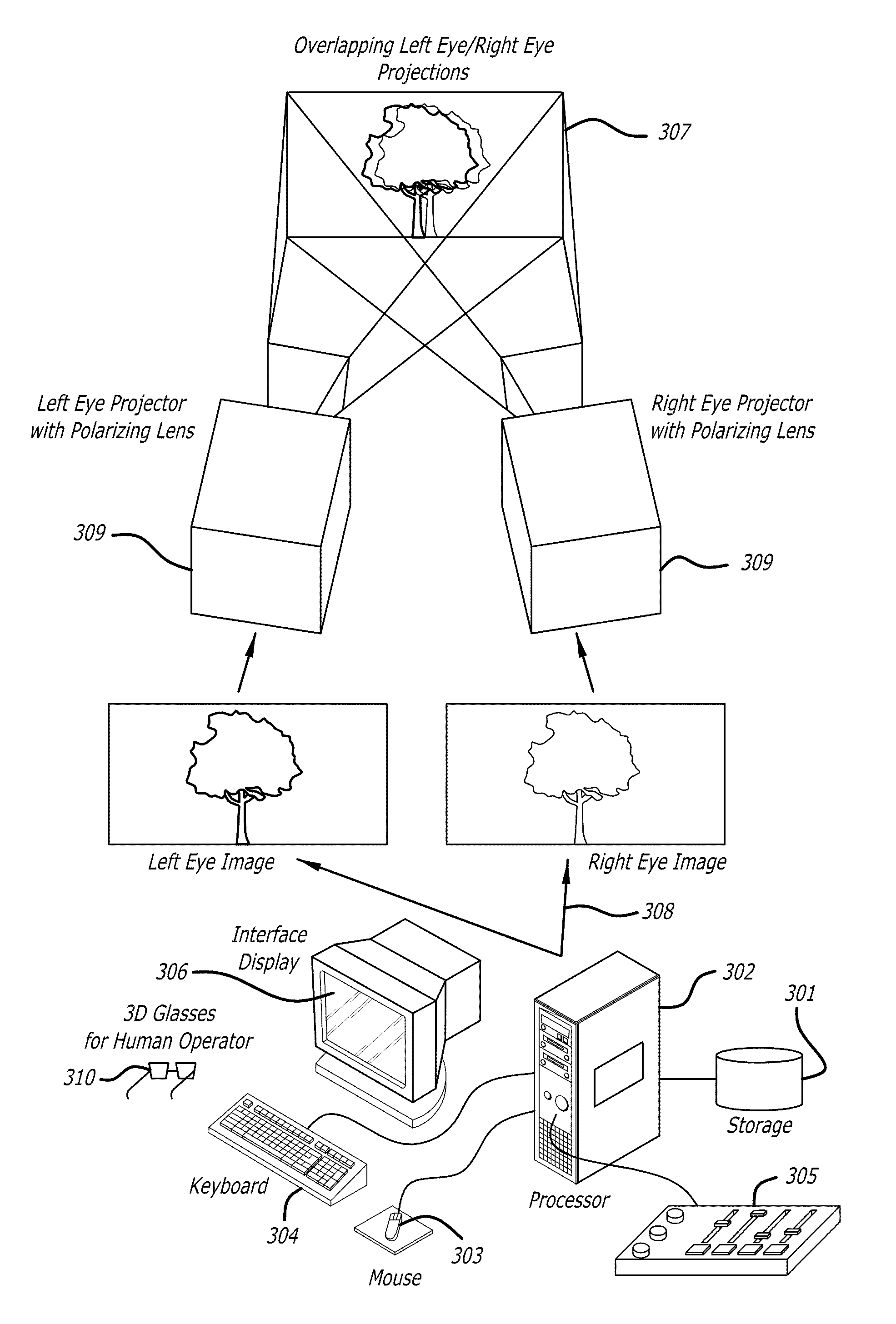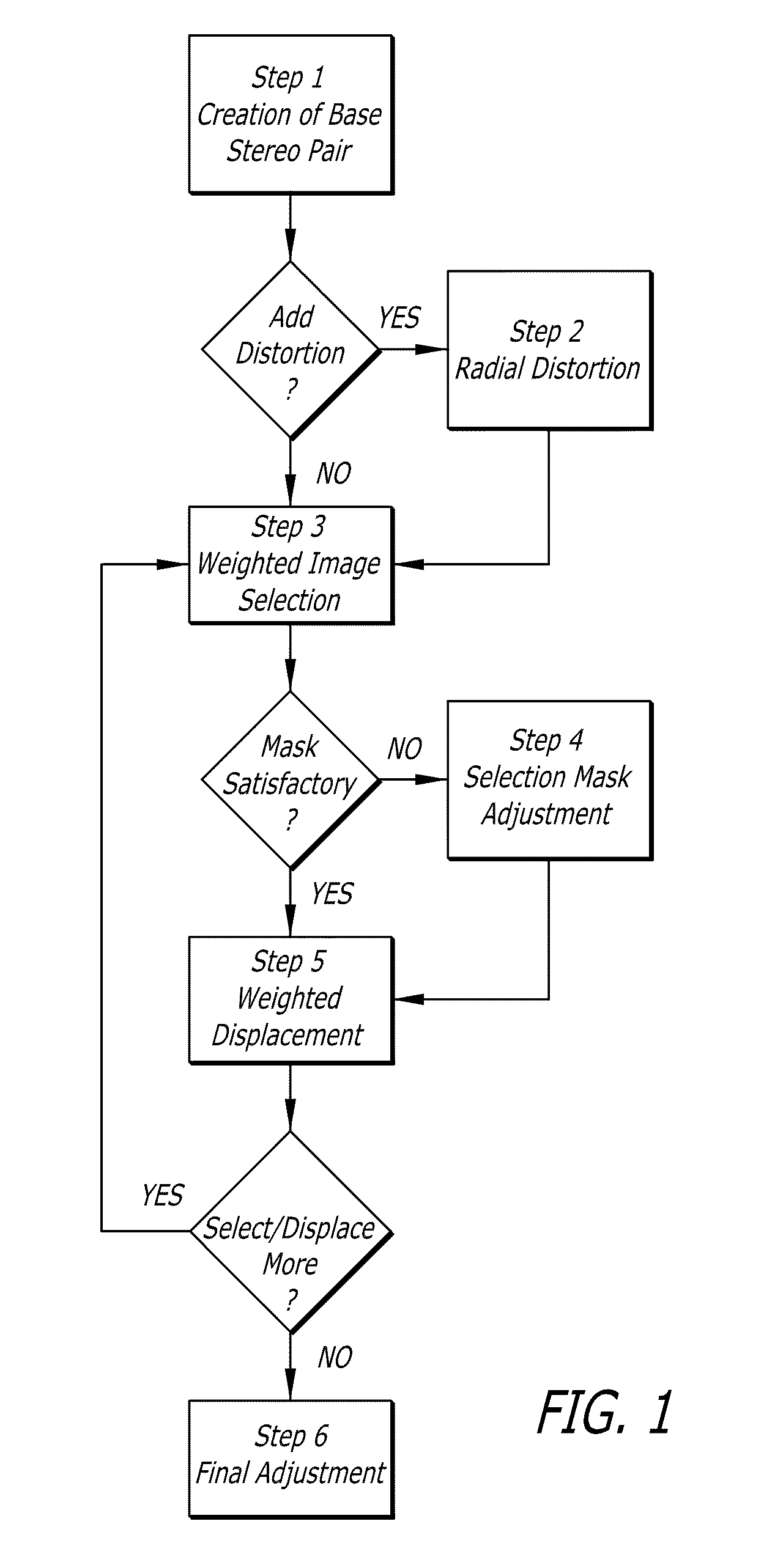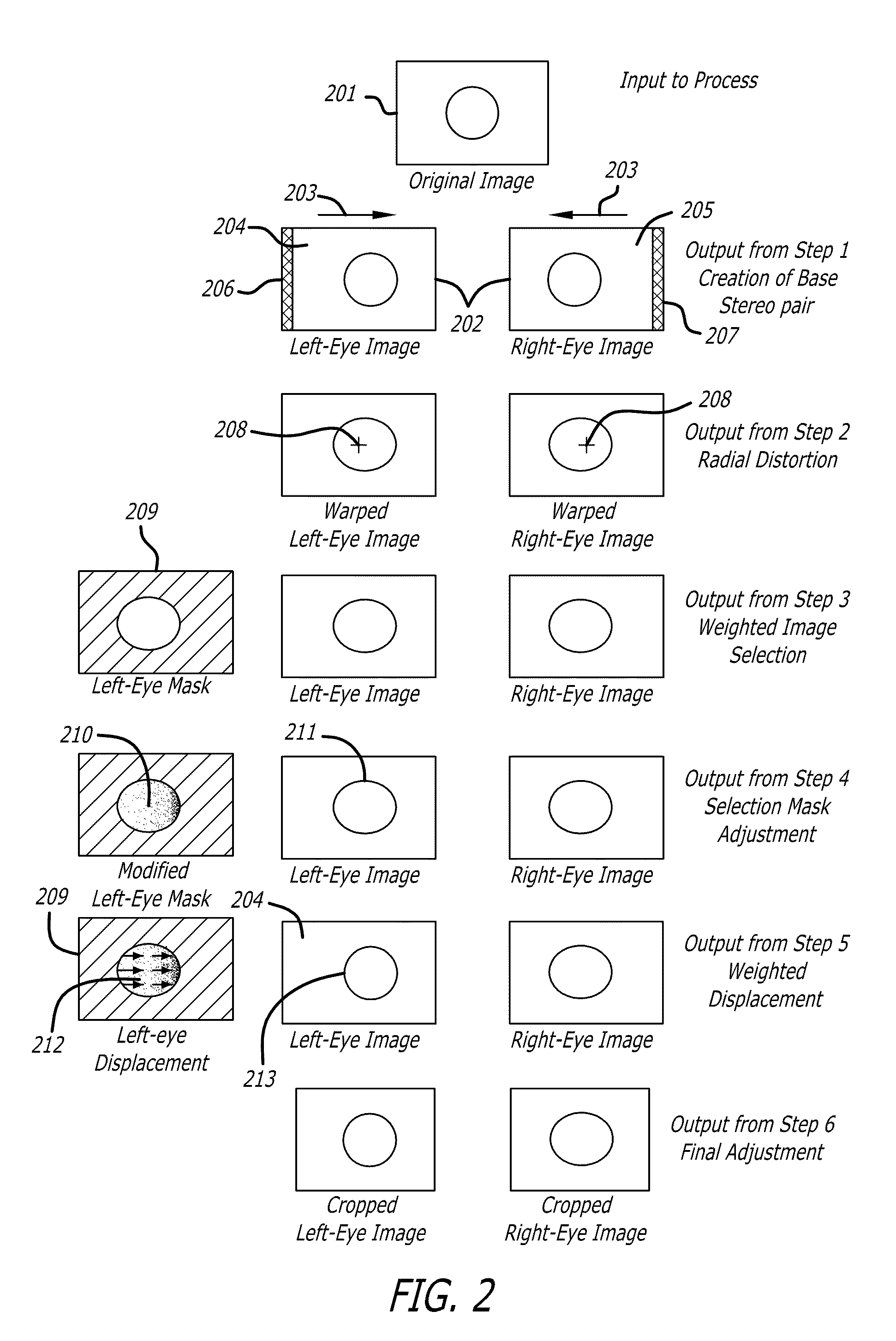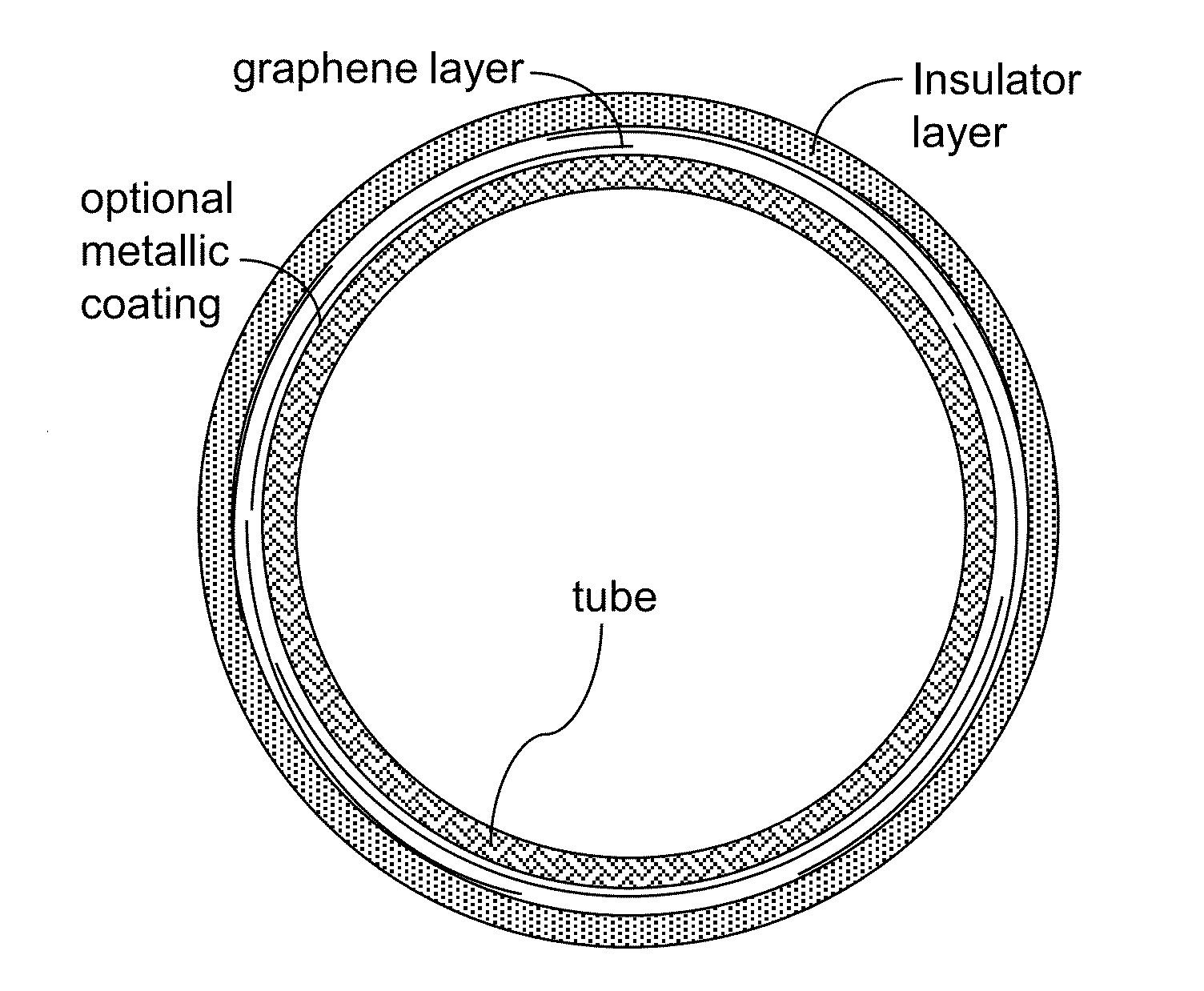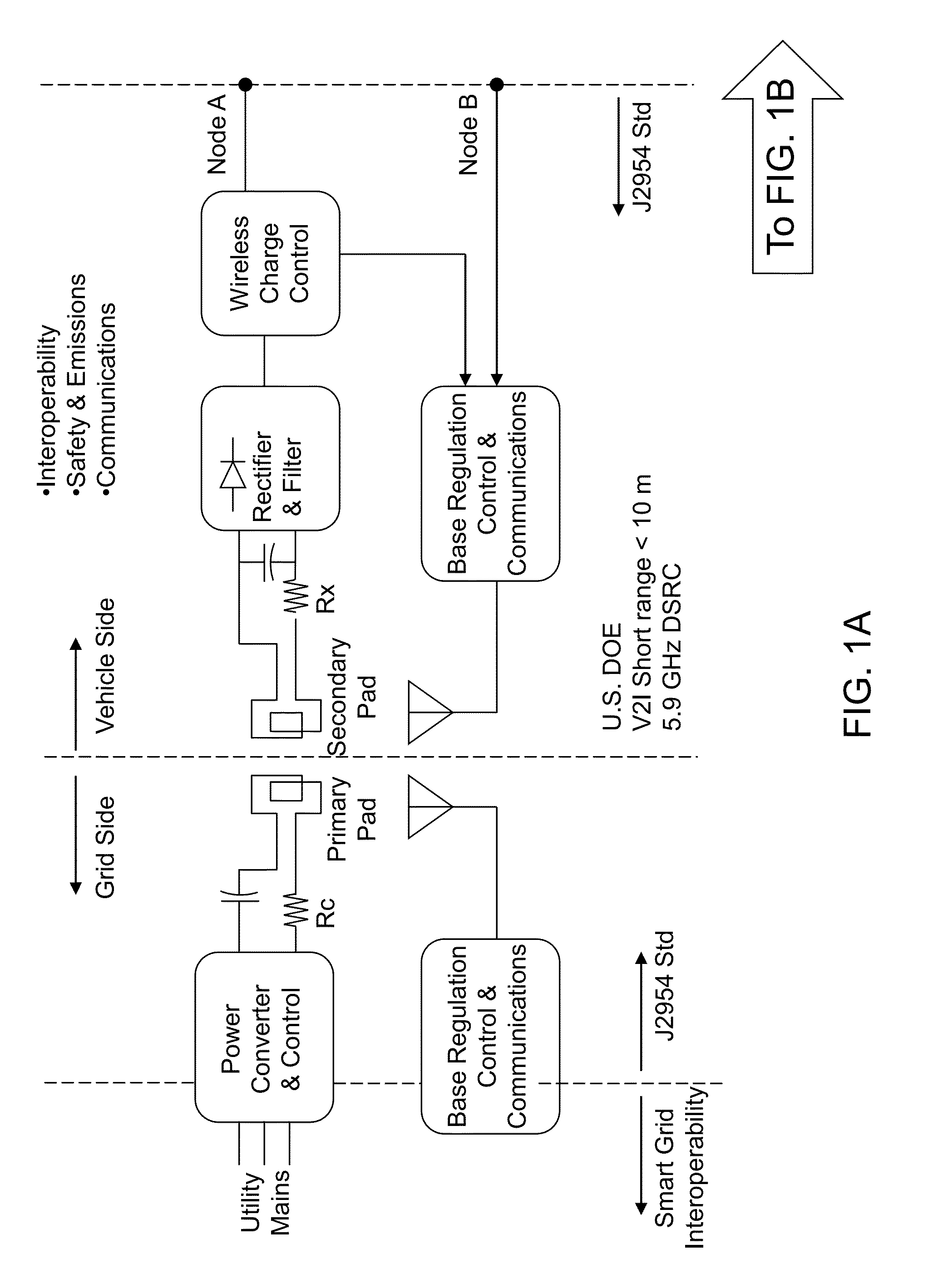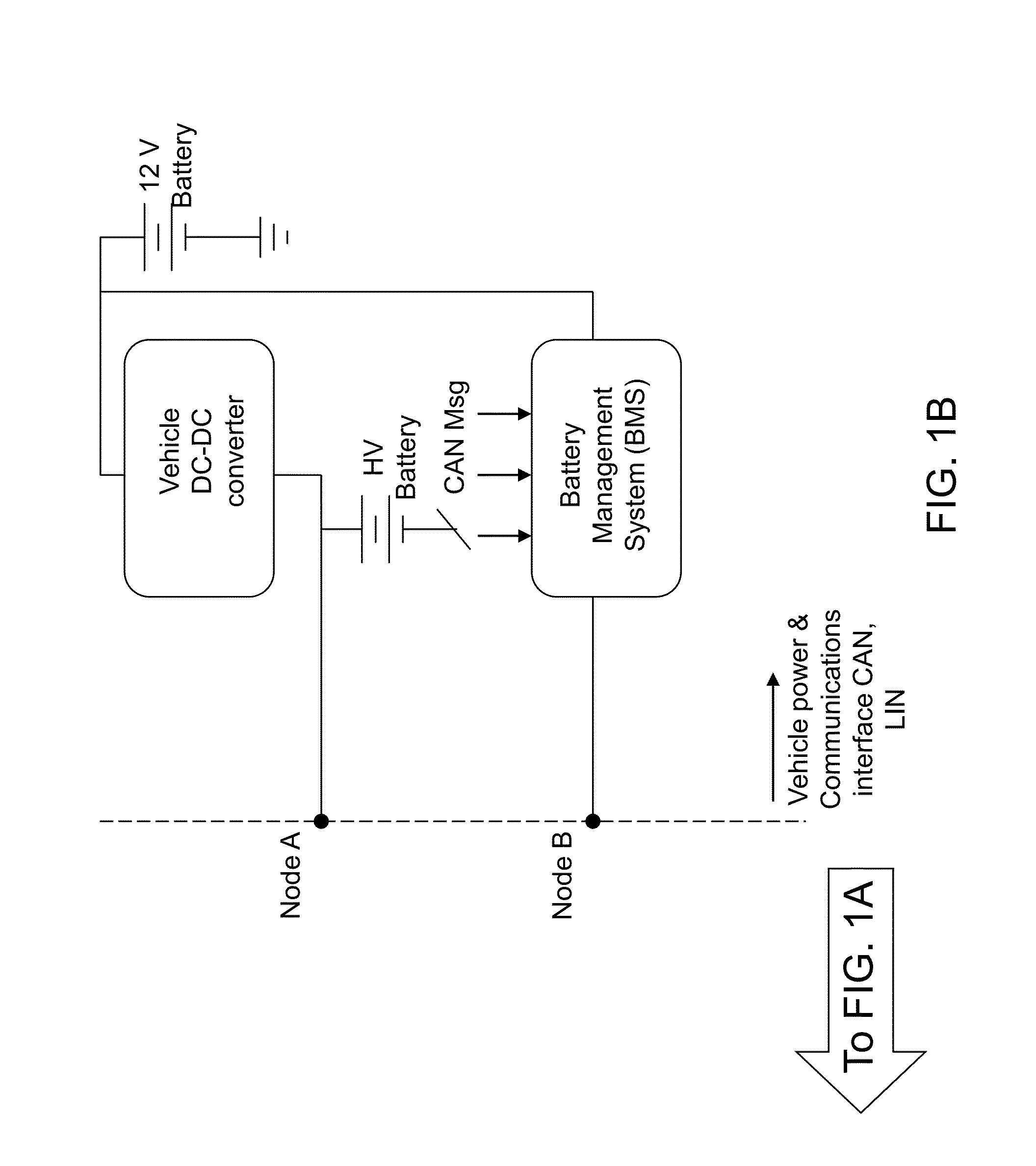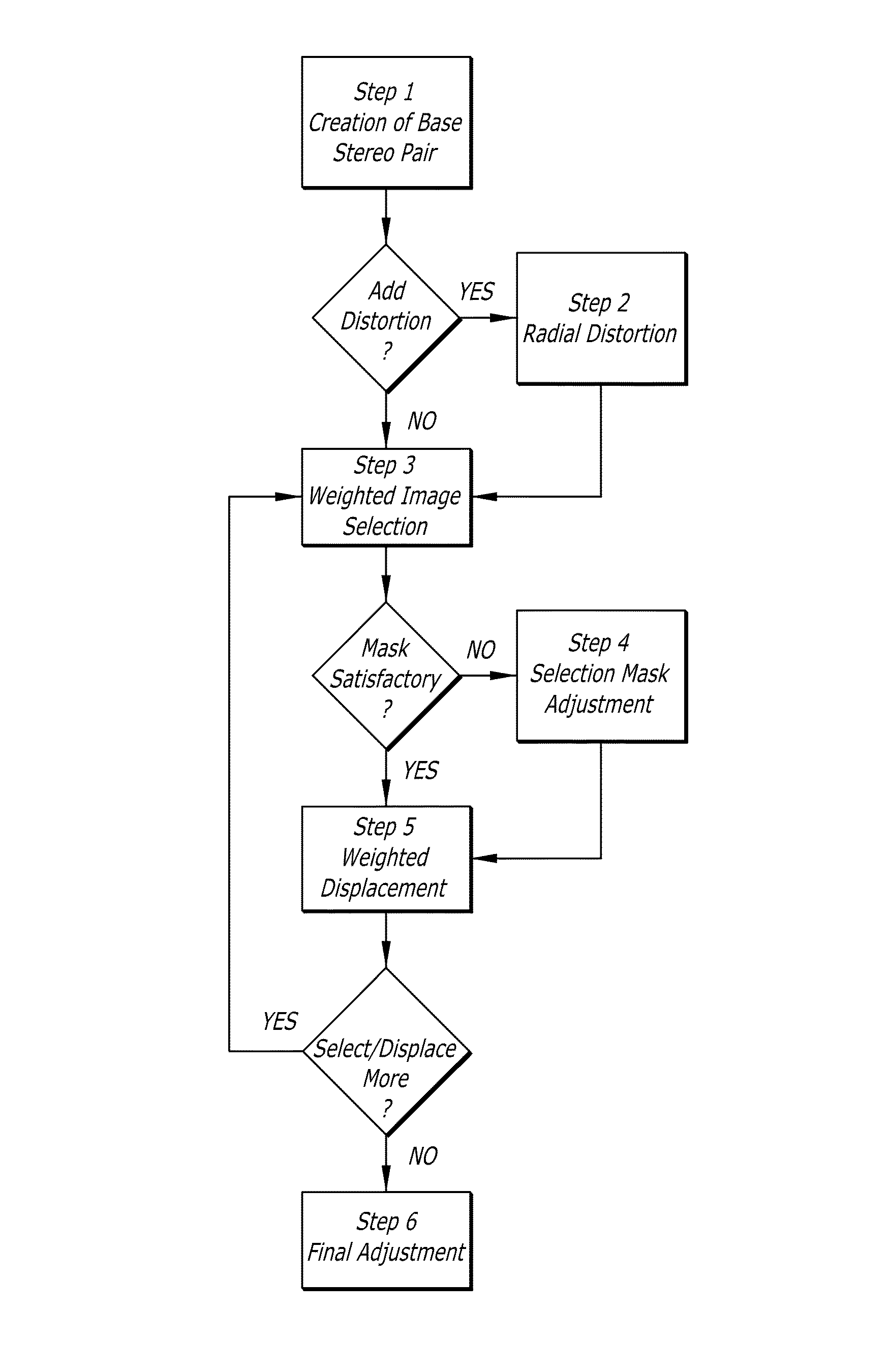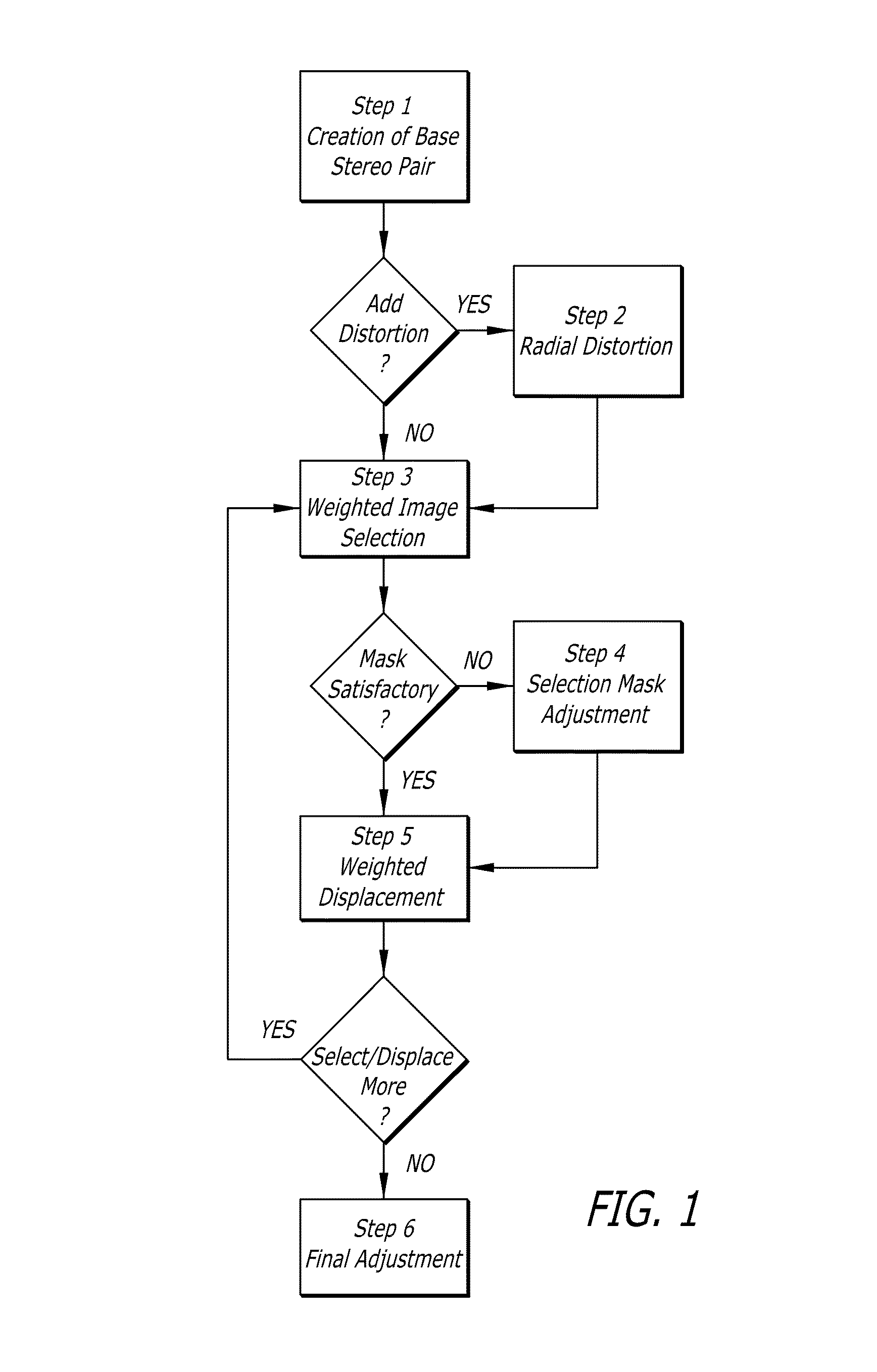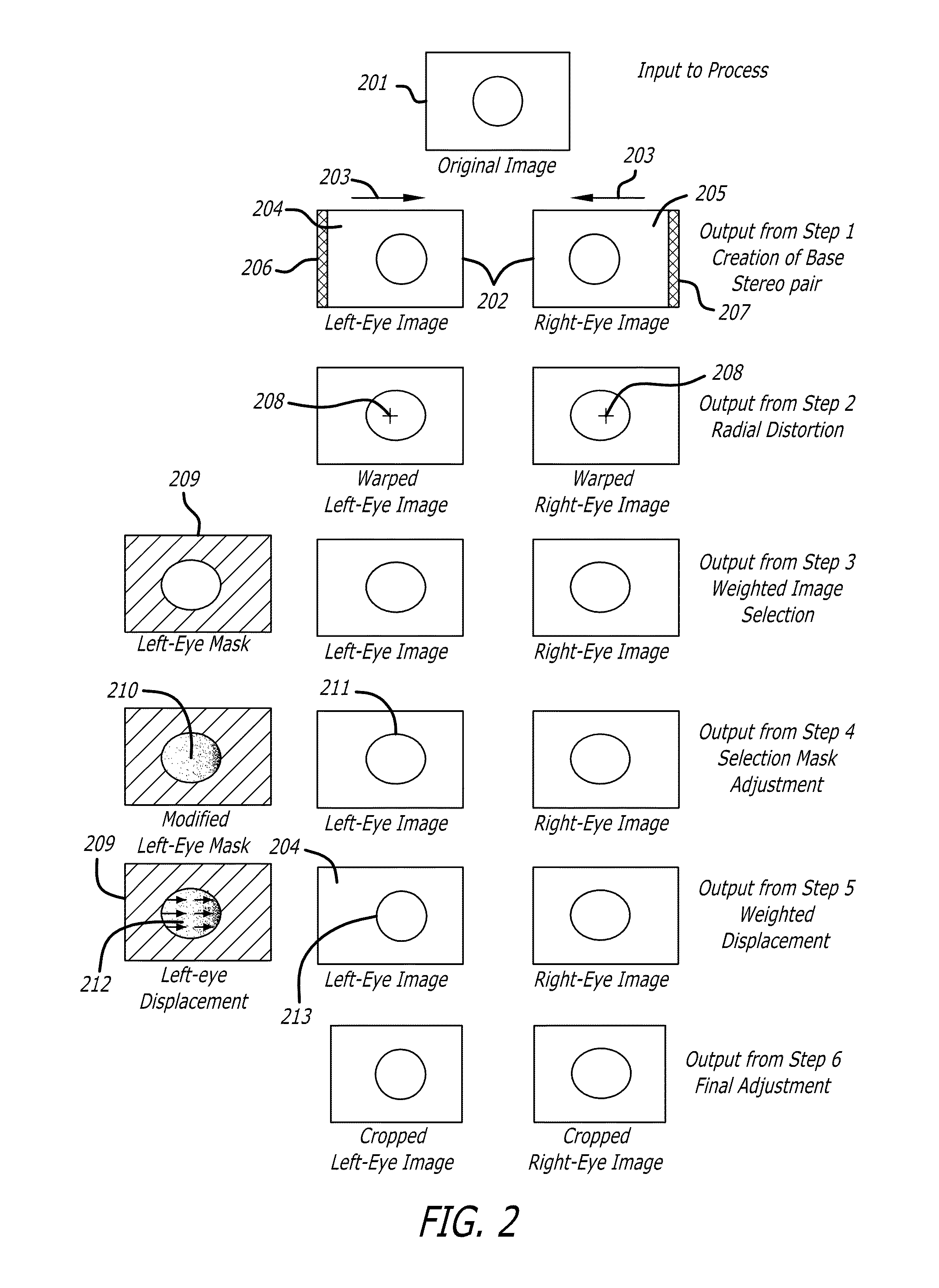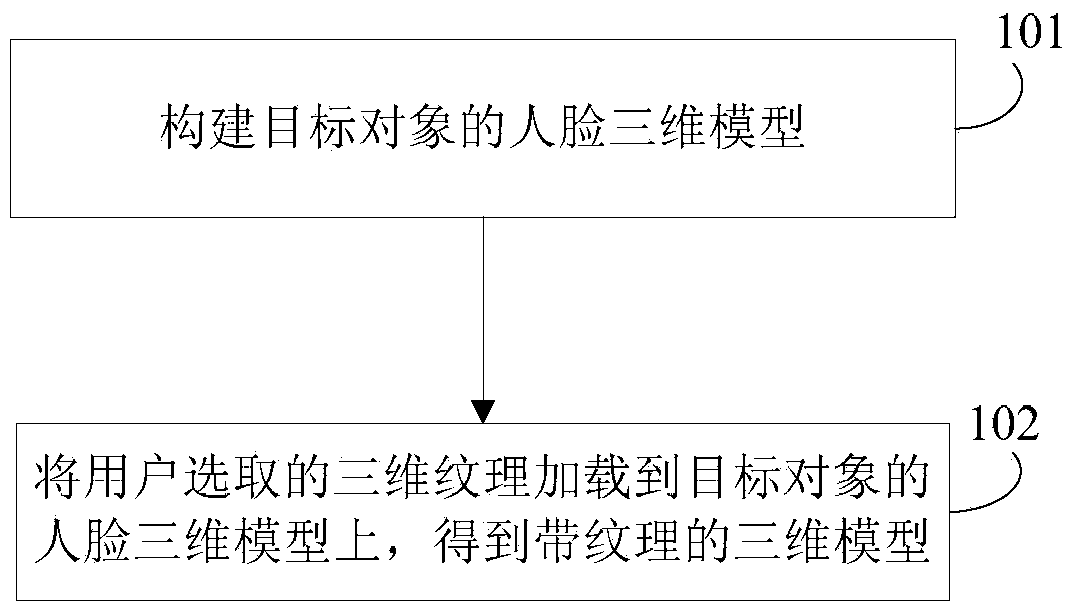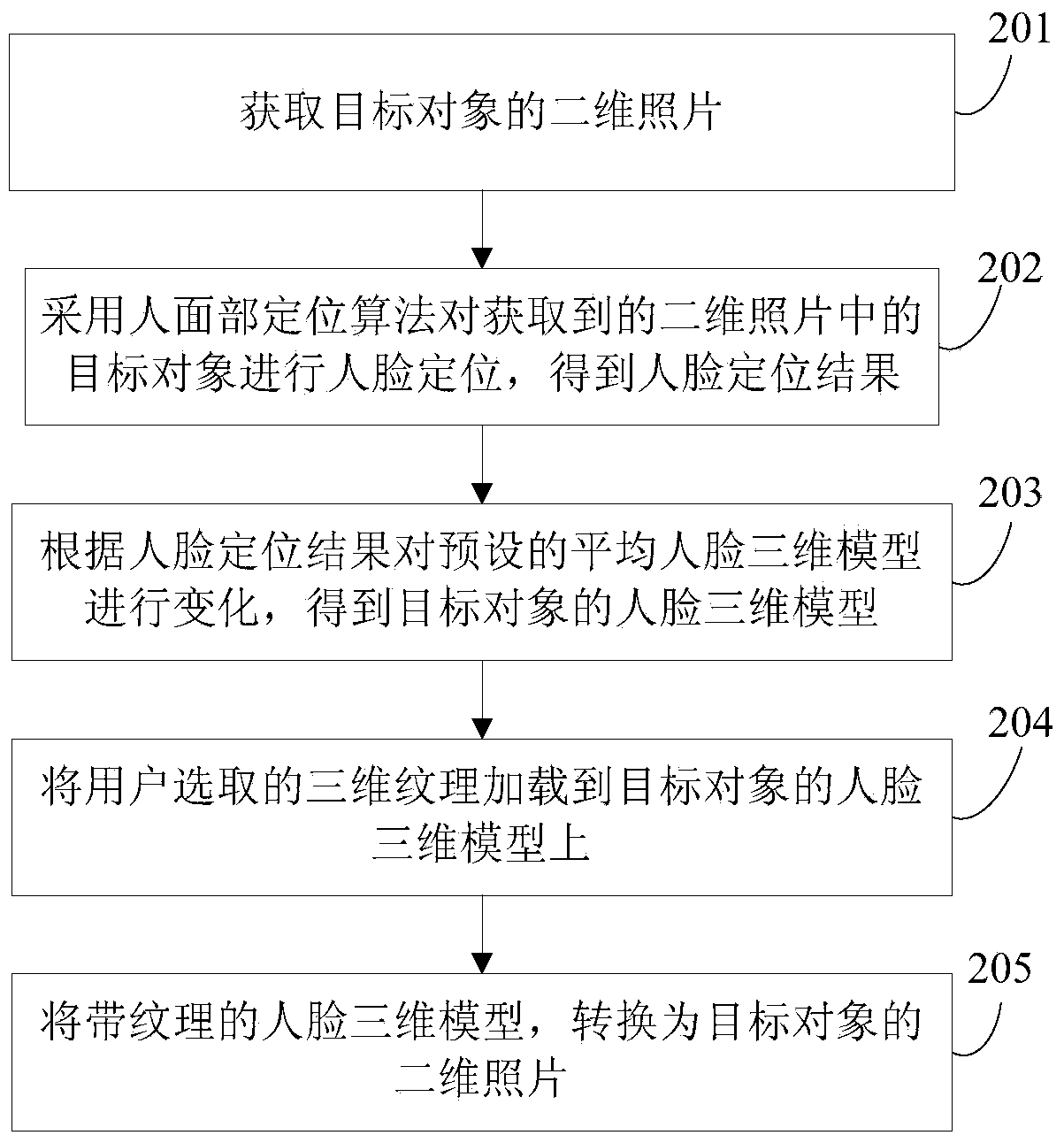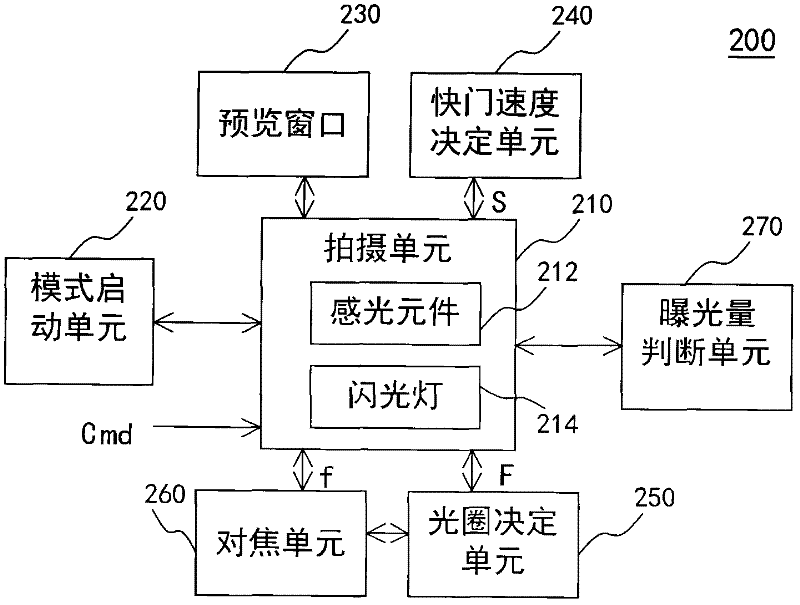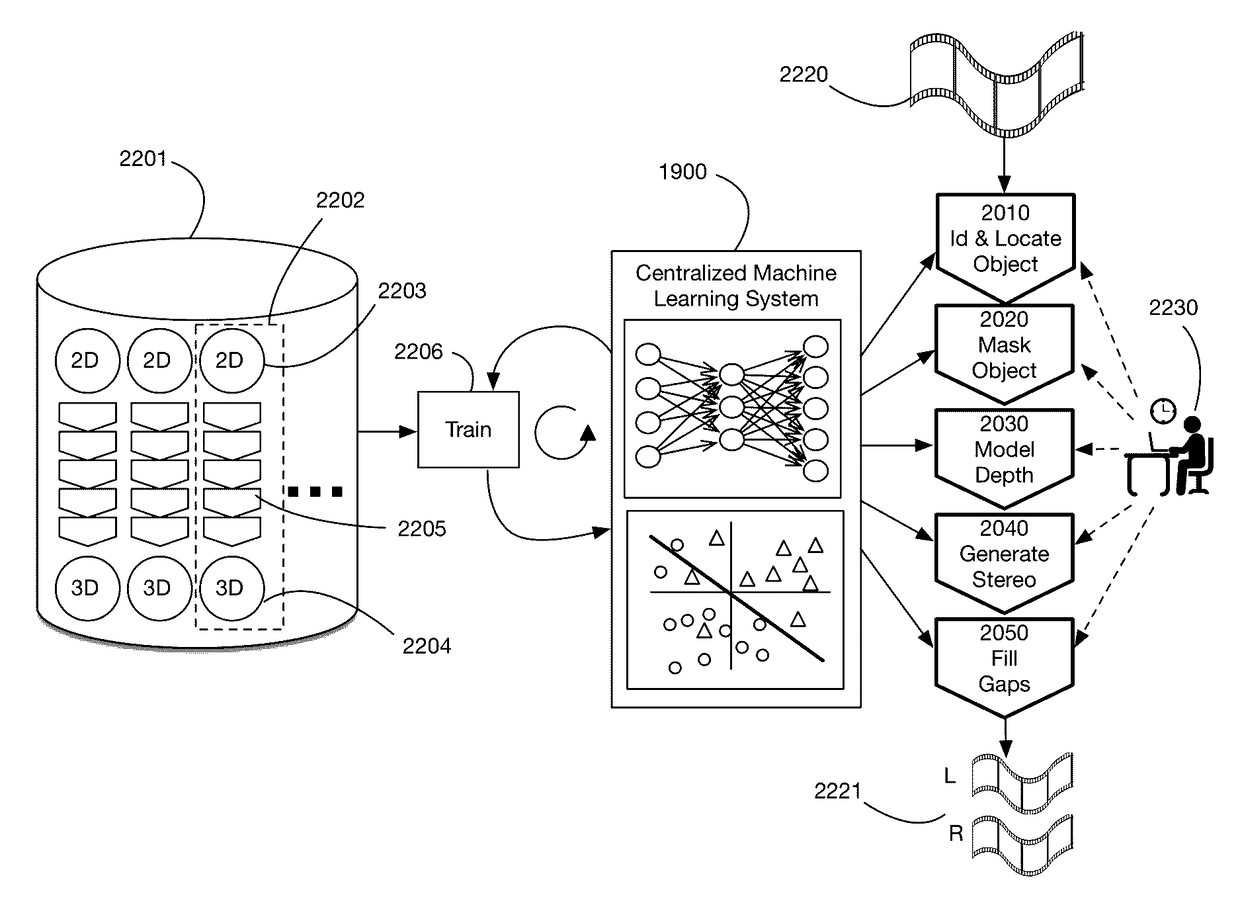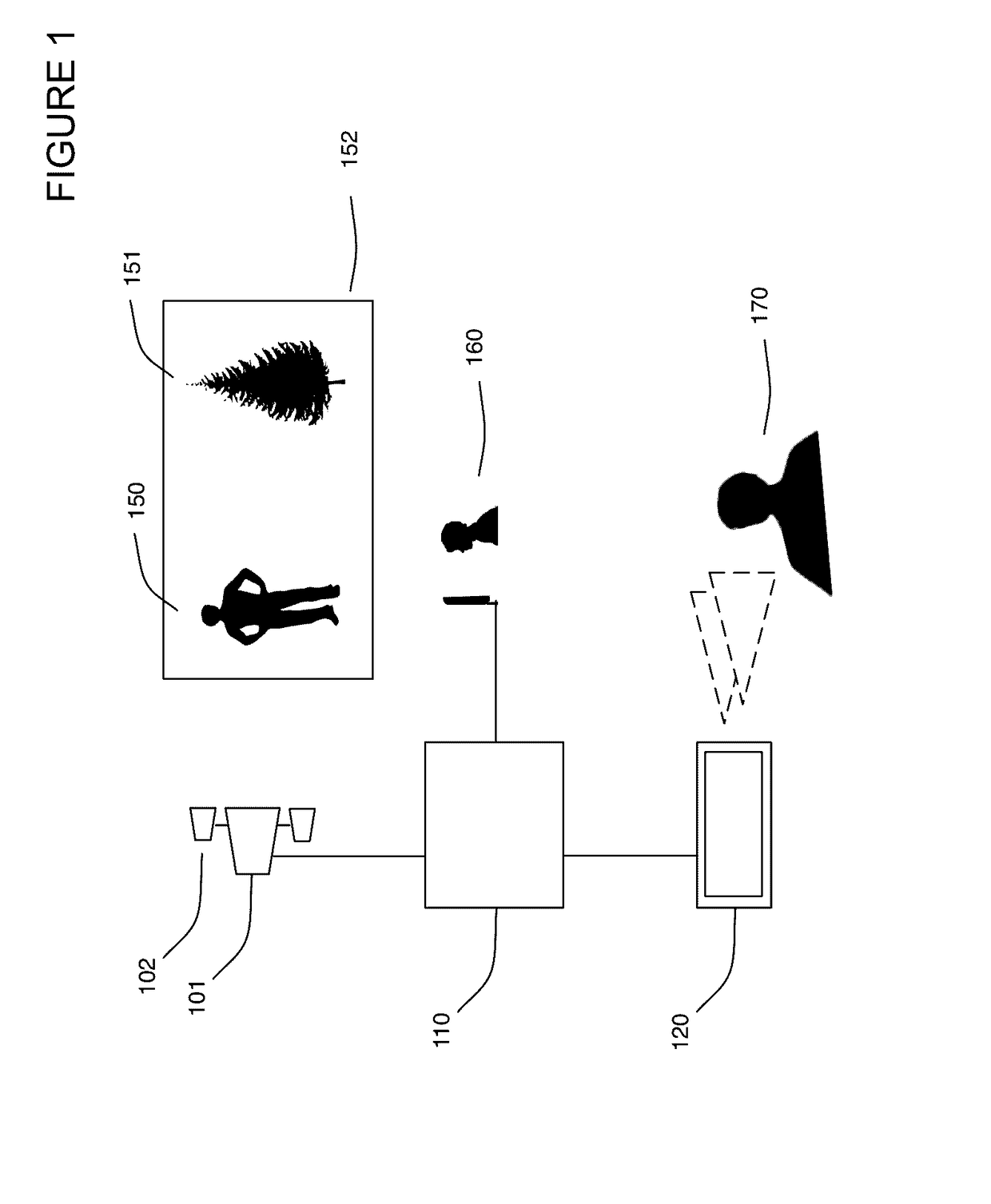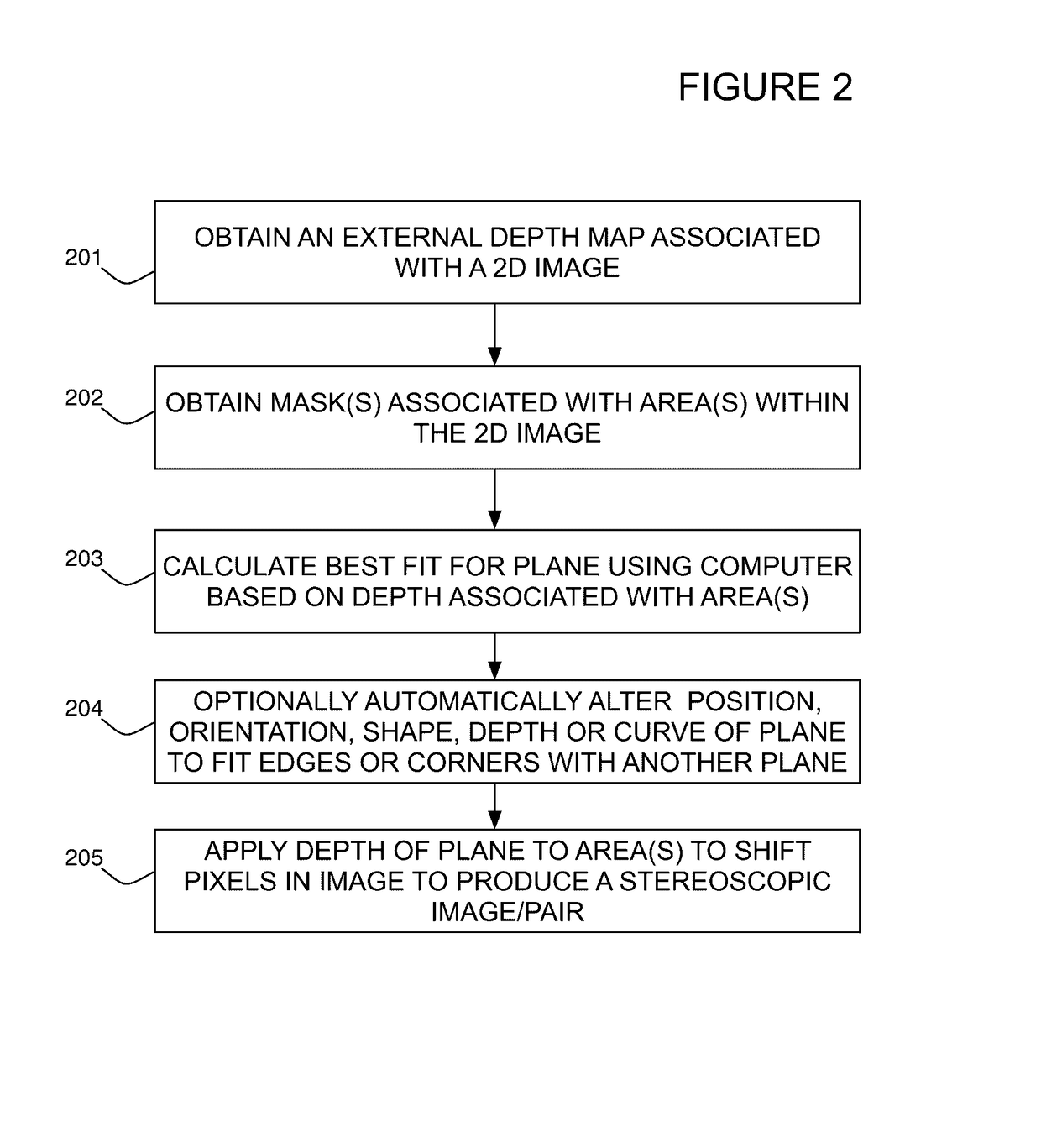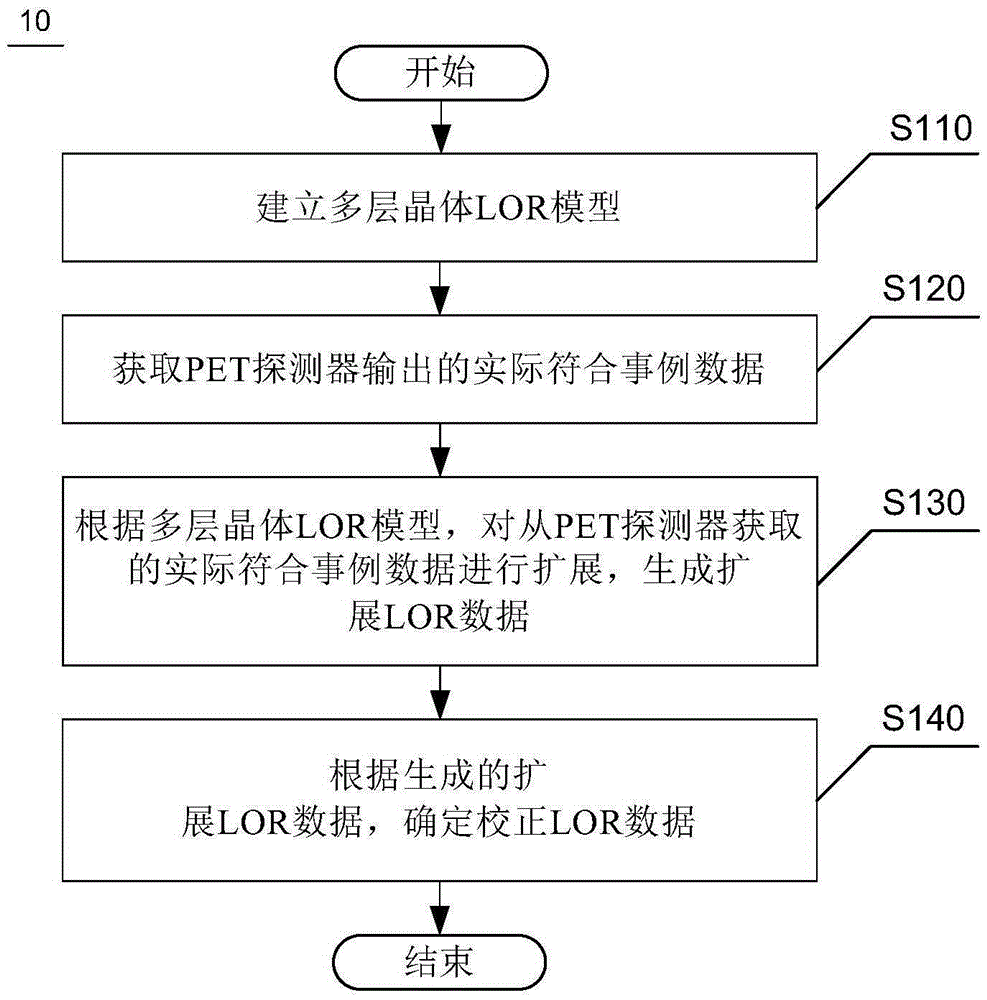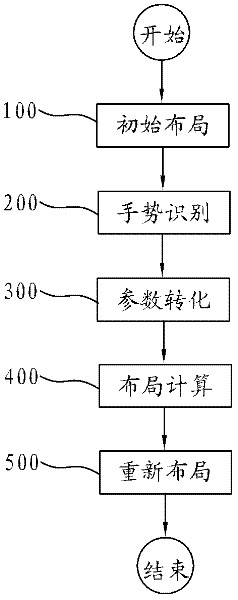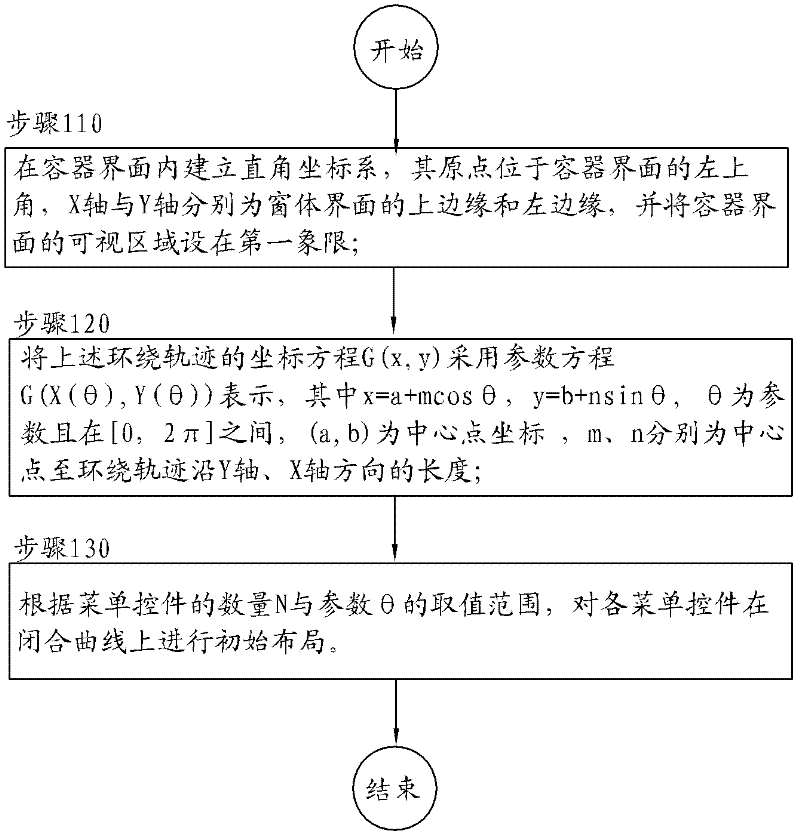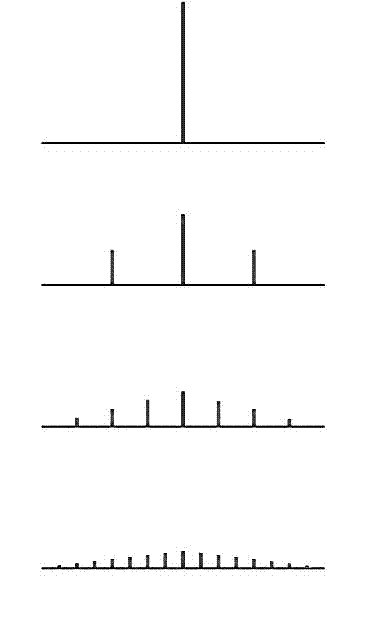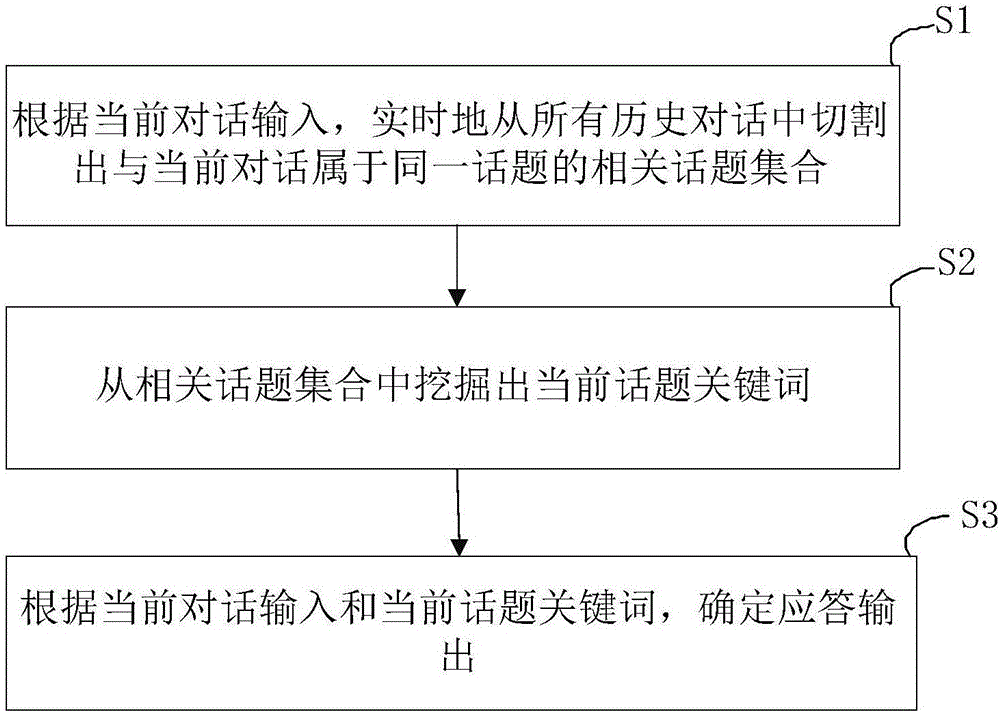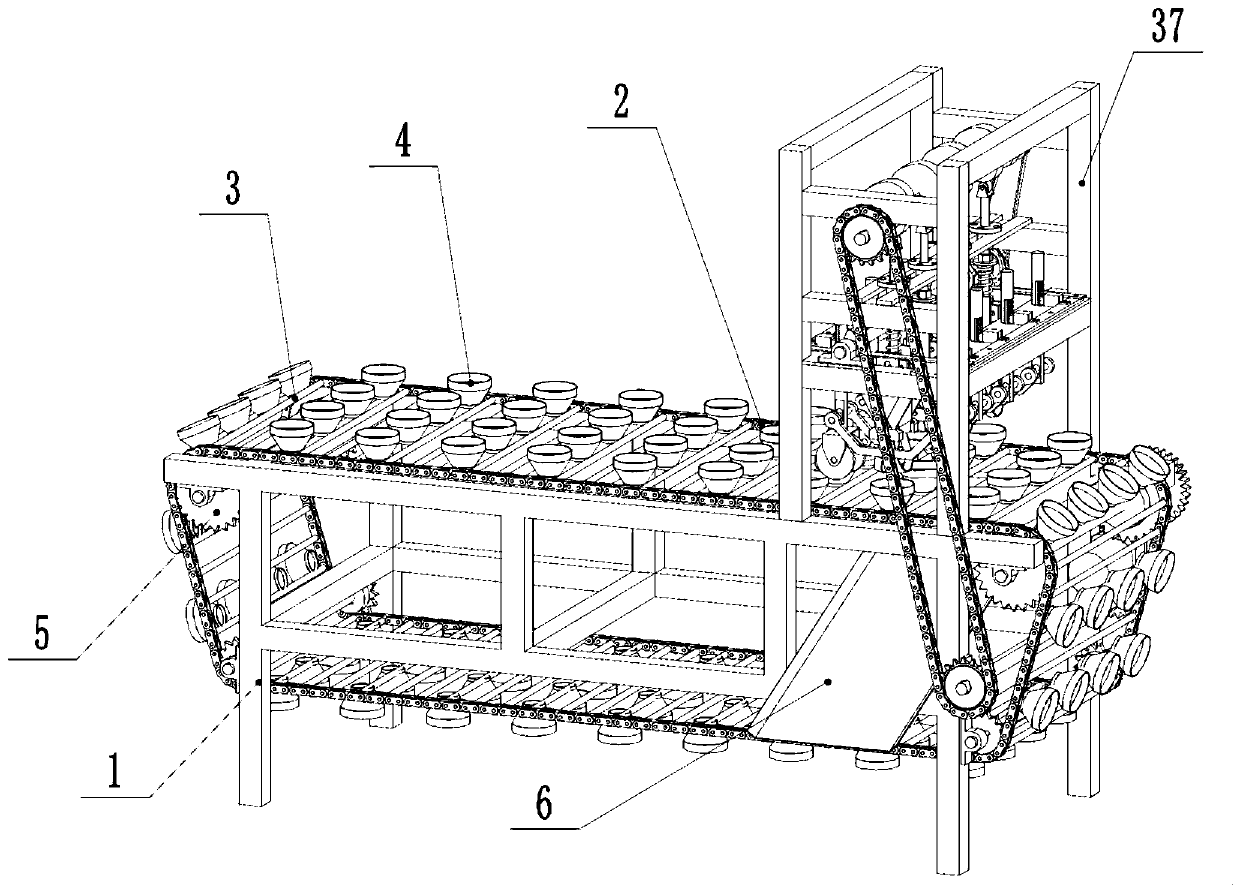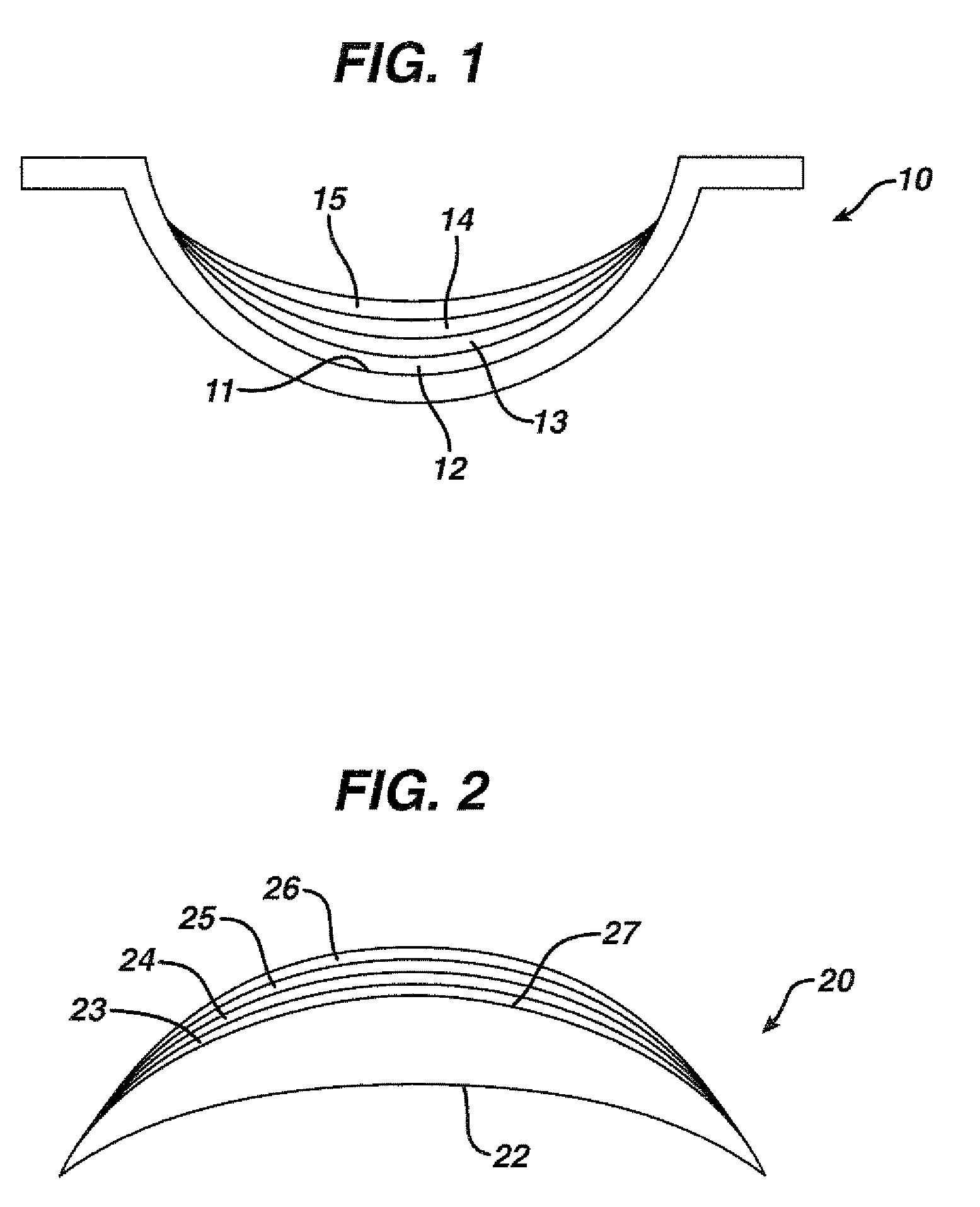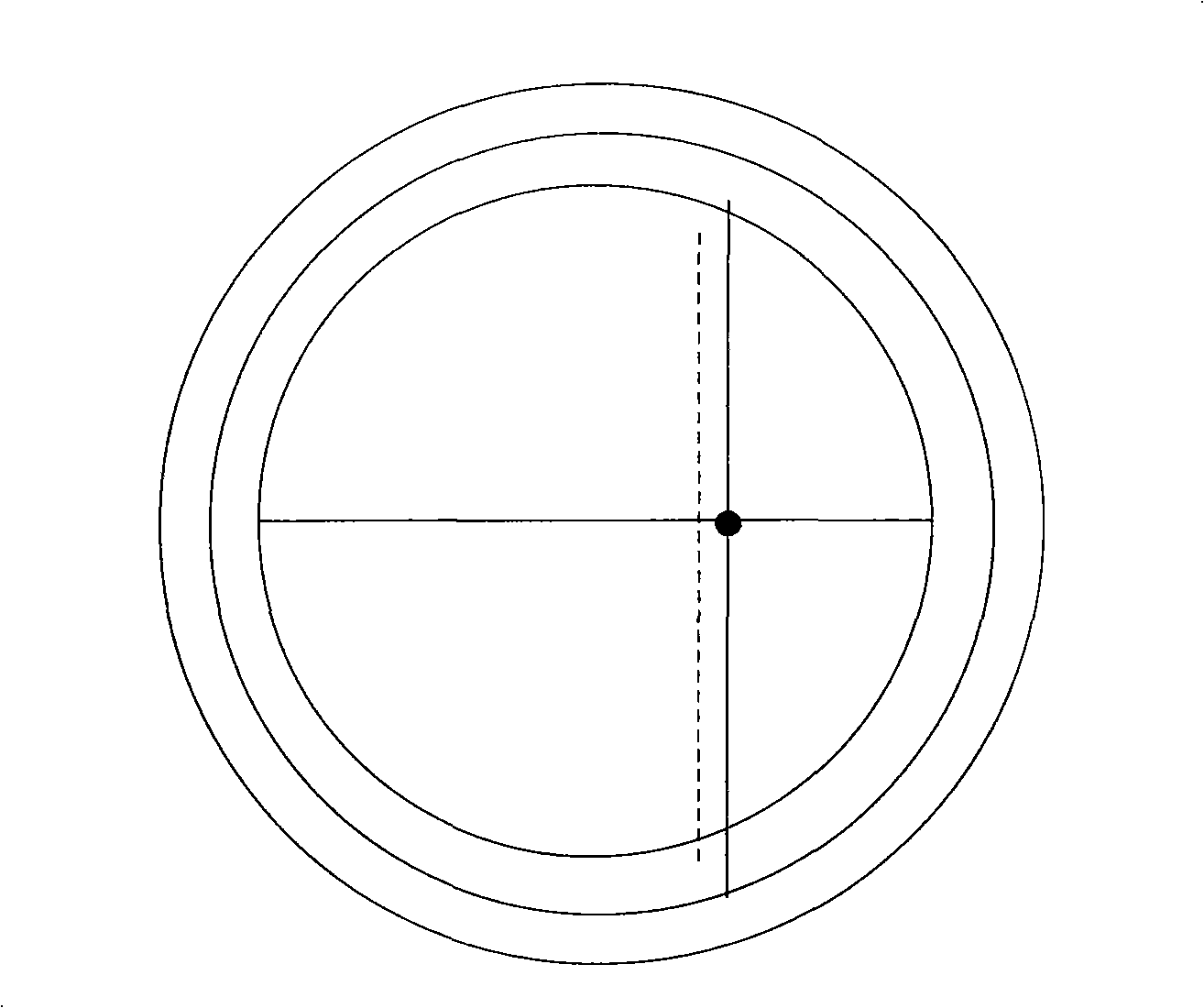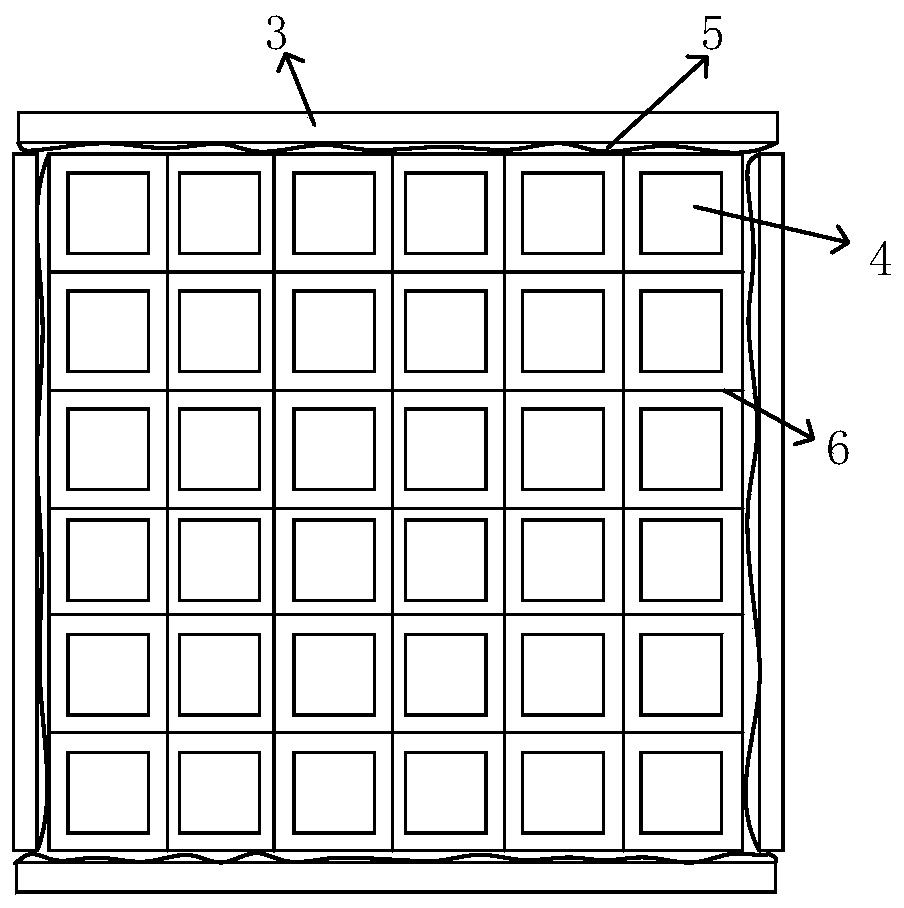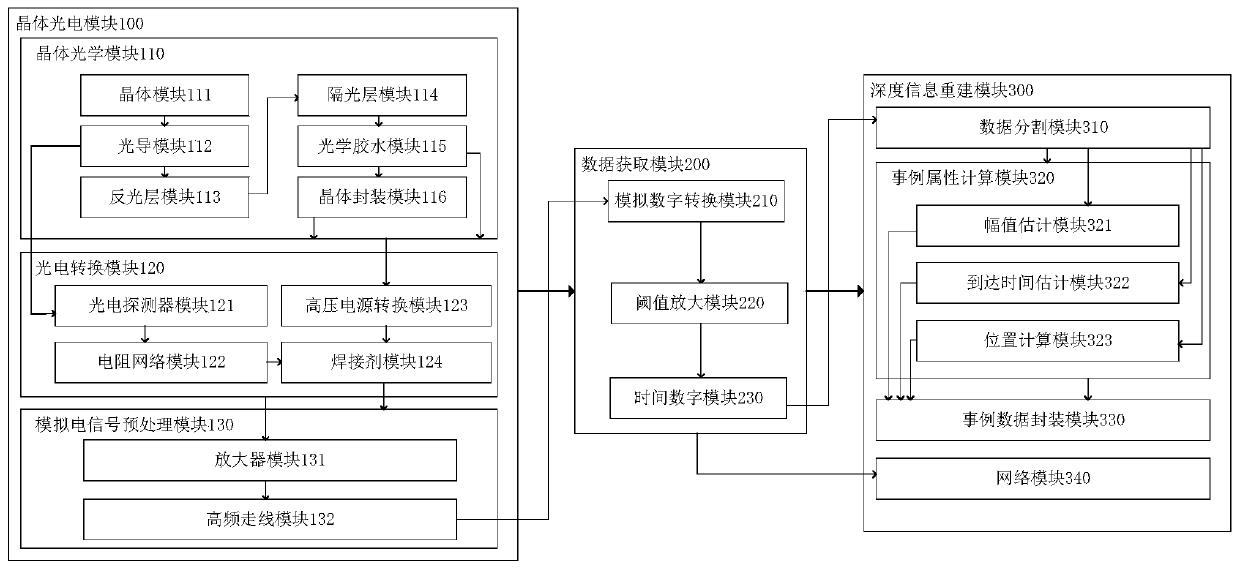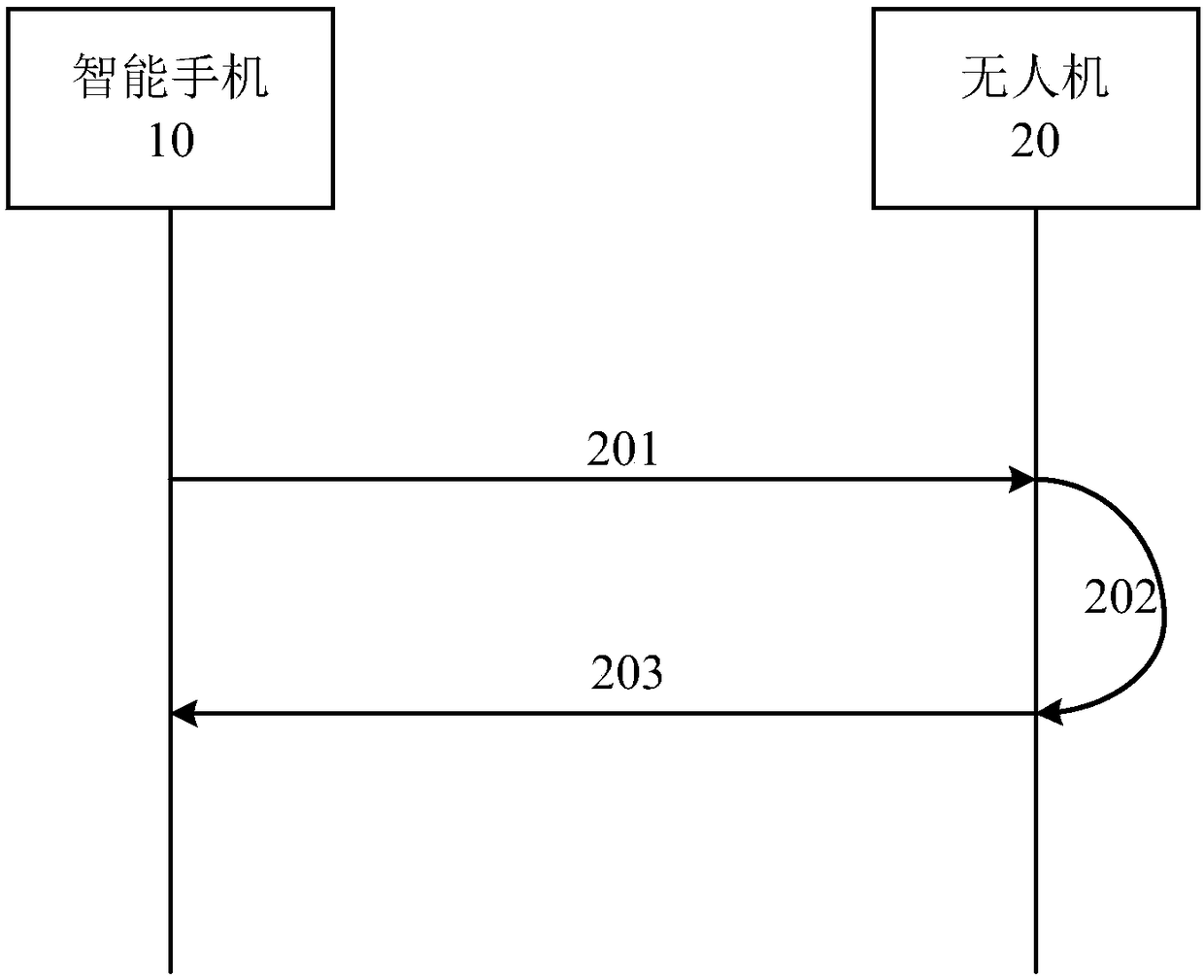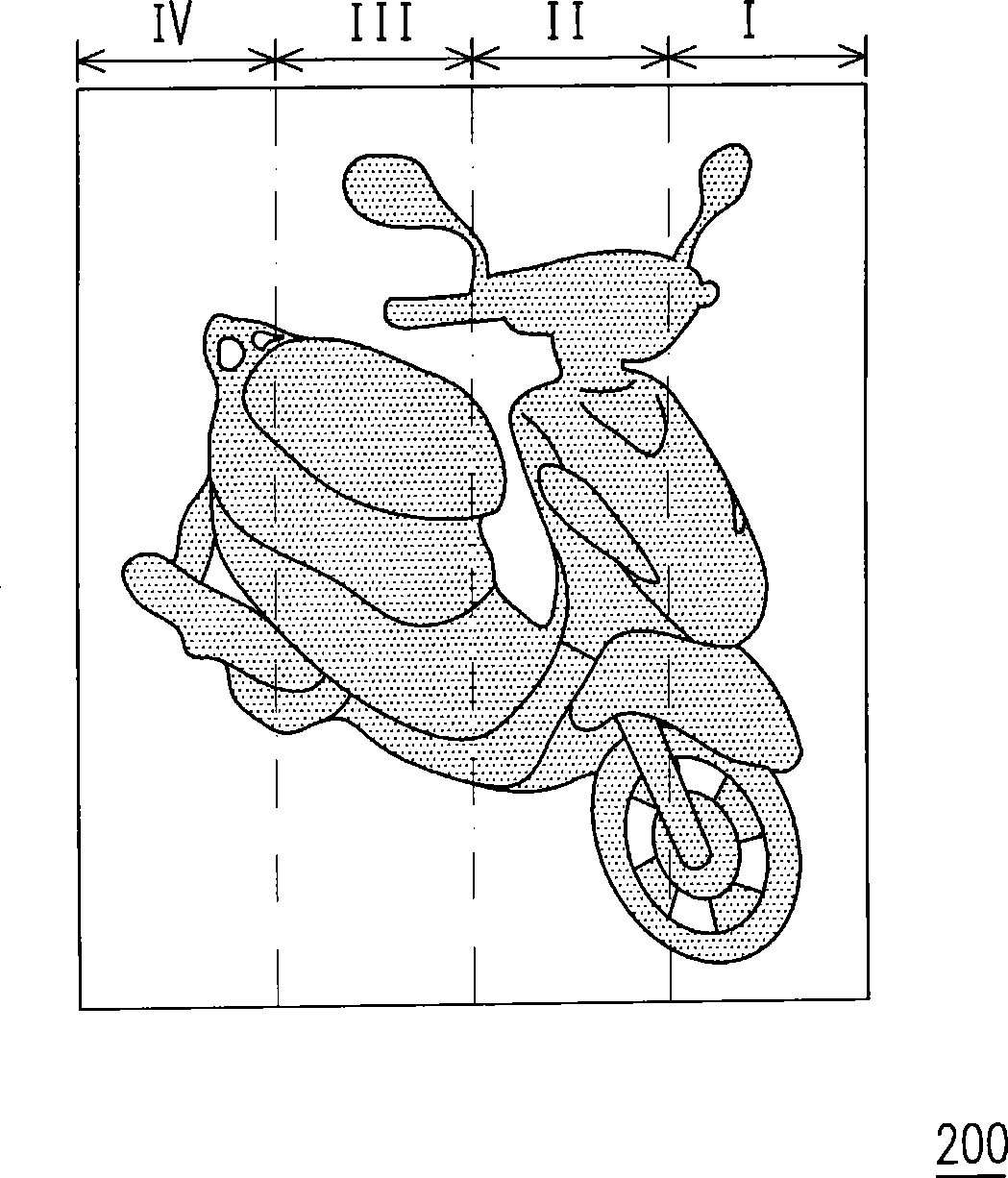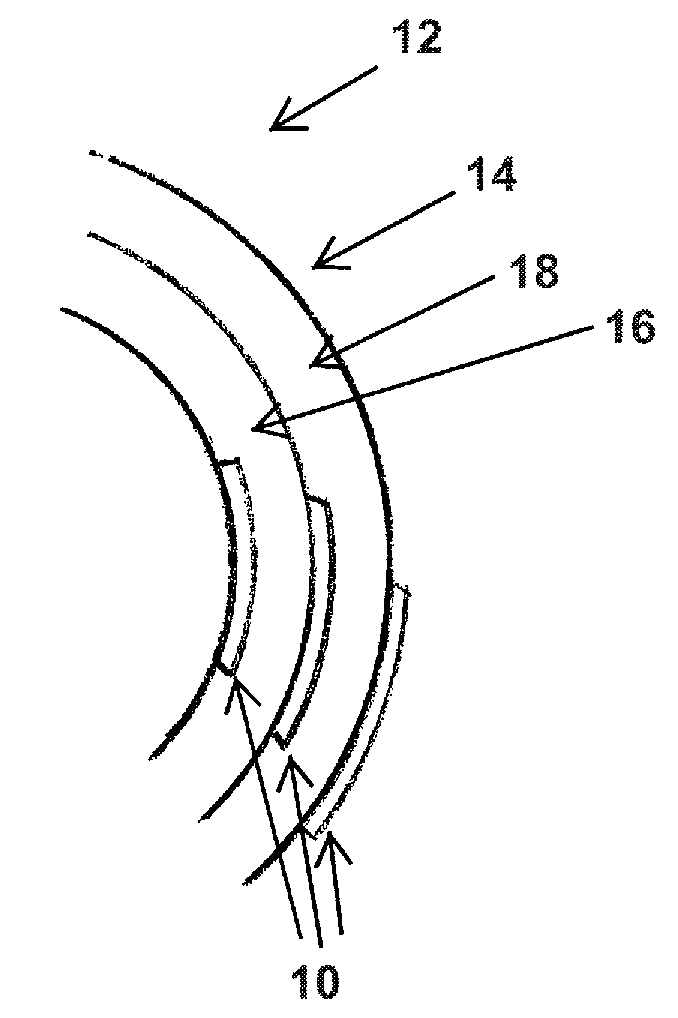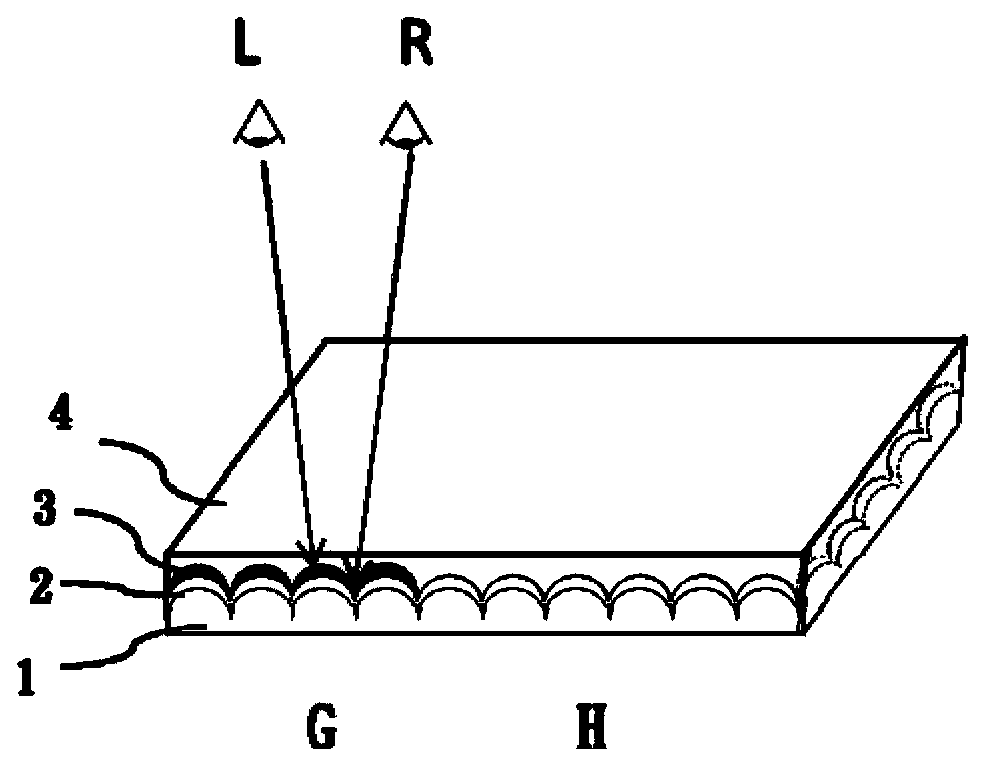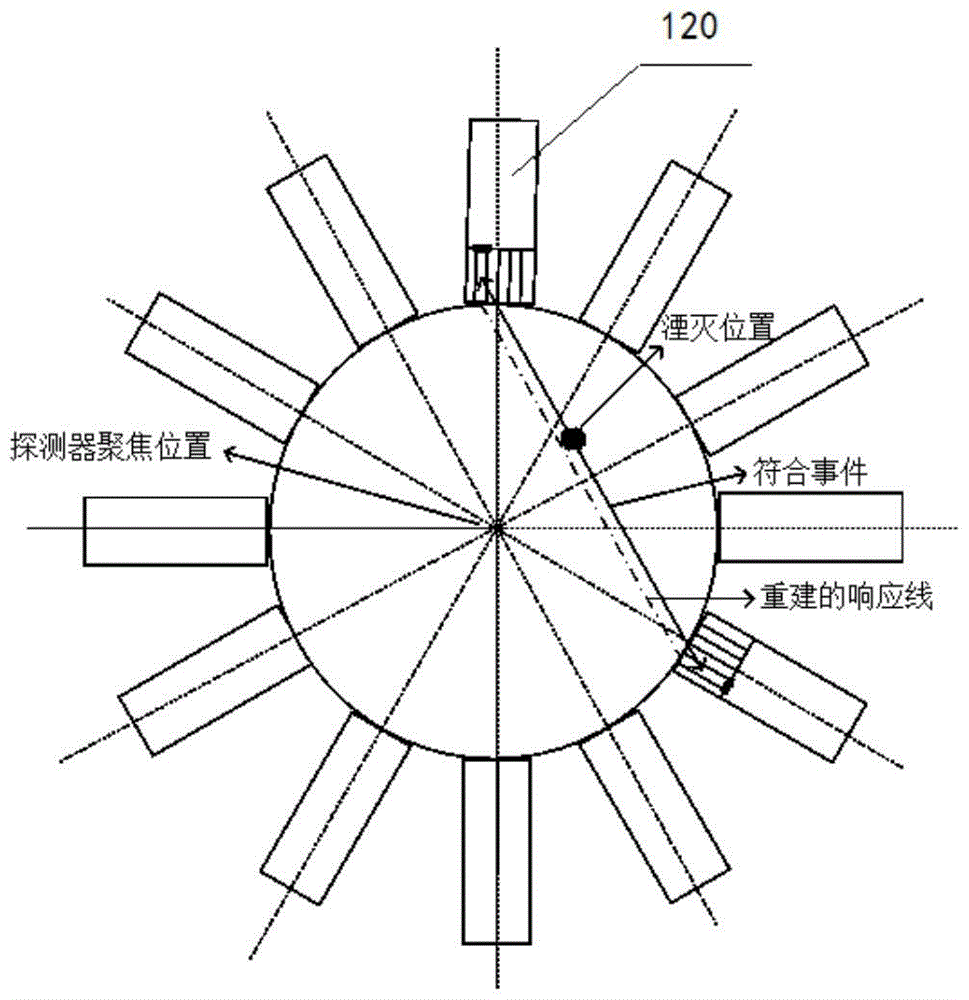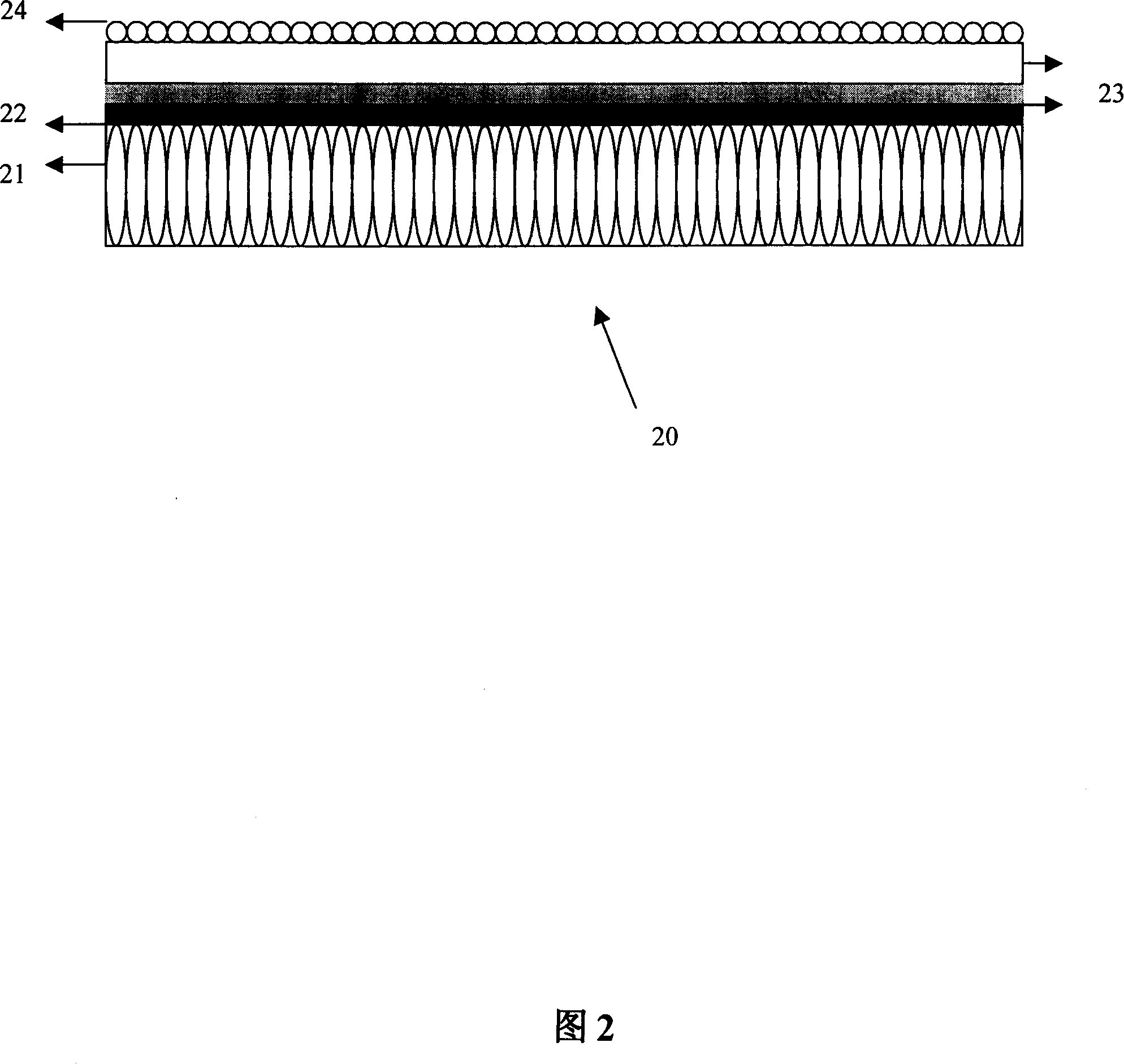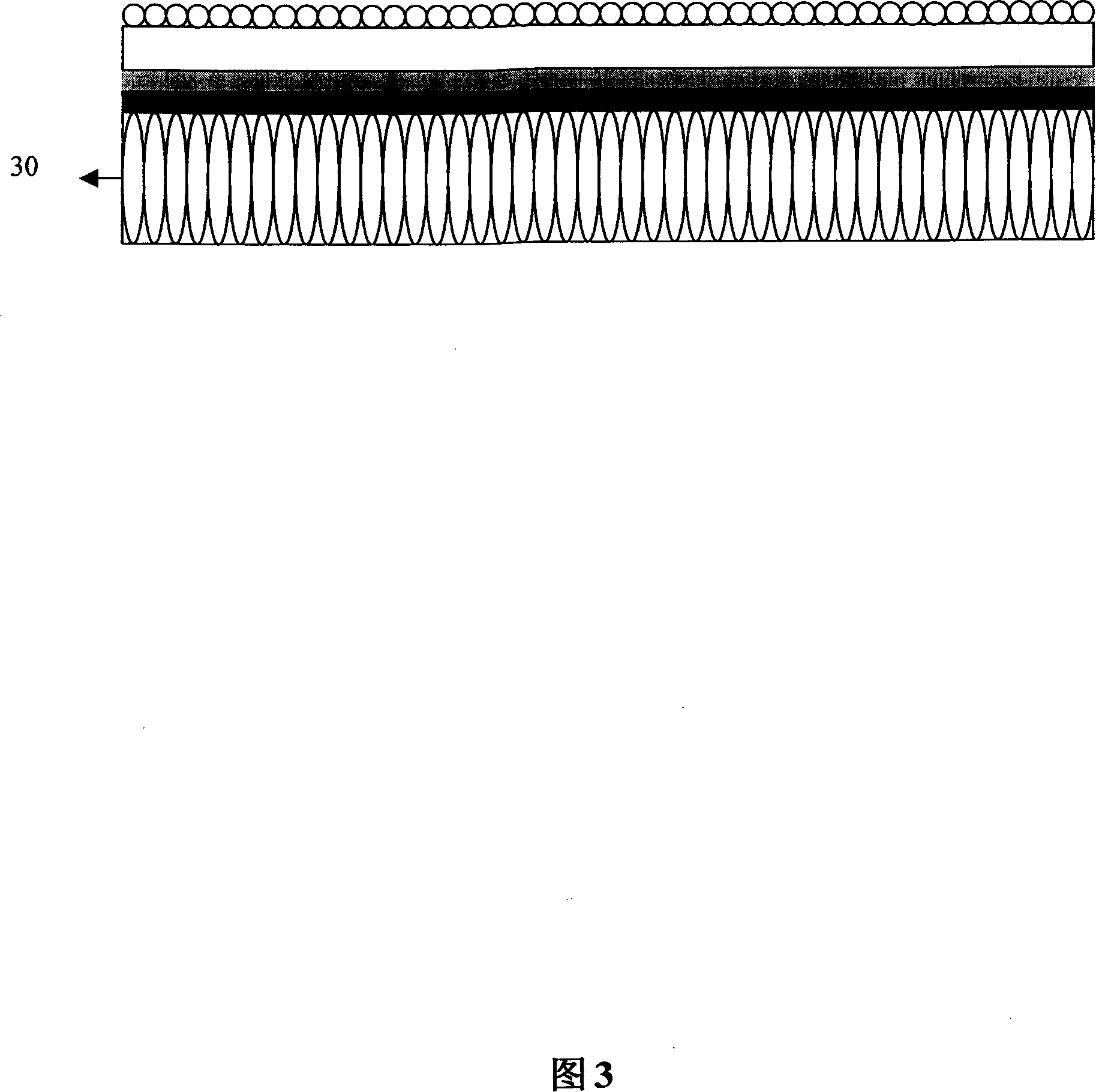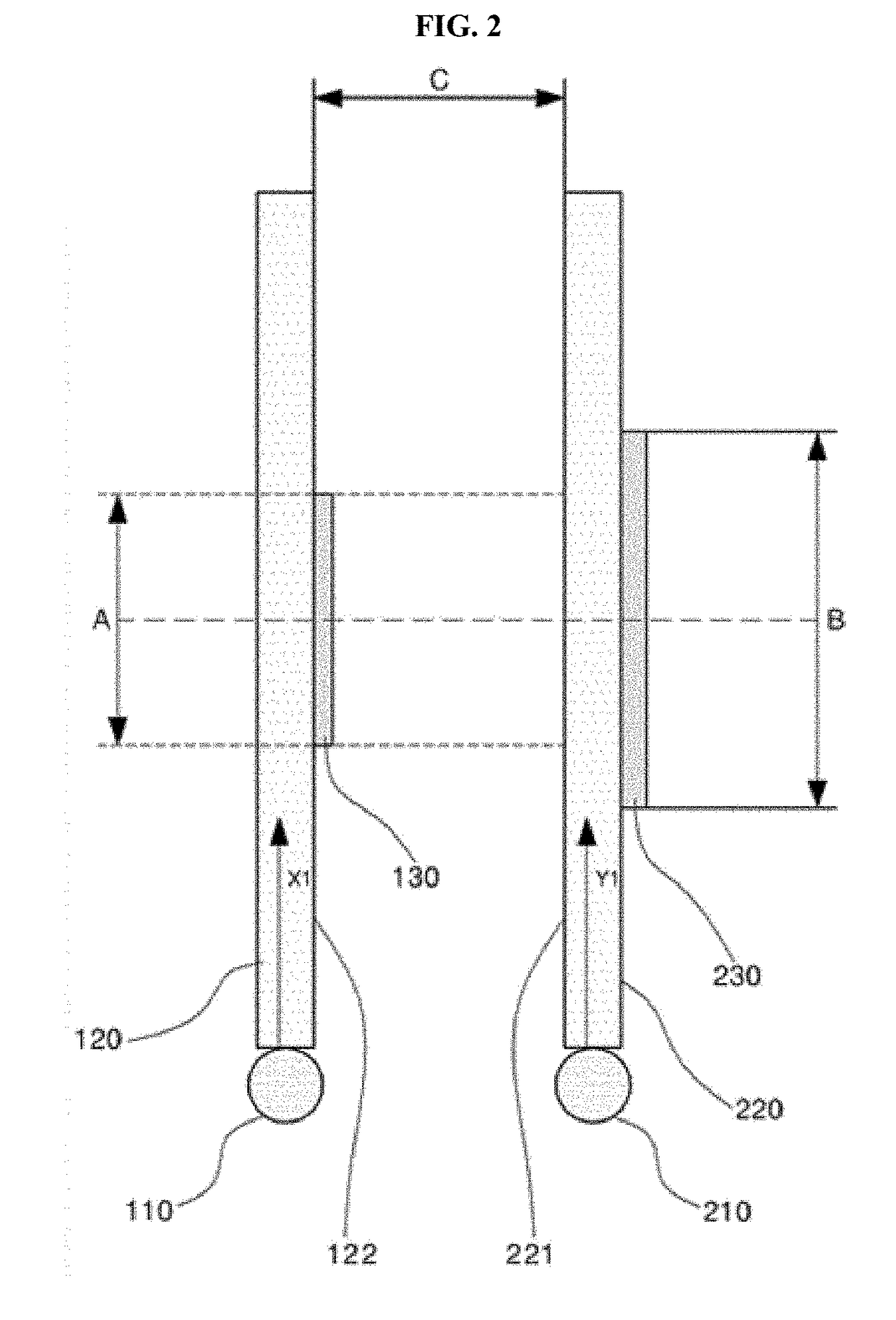Patents
Literature
Hiro is an intelligent assistant for R&D personnel, combined with Patent DNA, to facilitate innovative research.
65 results about "Depth effect" patented technology
Efficacy Topic
Property
Owner
Technical Advancement
Application Domain
Technology Topic
Technology Field Word
Patent Country/Region
Patent Type
Patent Status
Application Year
Inventor
System and process for transforming two-dimensional images into three-dimensional images
InactiveUS20110050864A1Enhance the imageSuperior methodImage analysisSteroscopic systems3d imageComputer graphics (images)
A system and process is provided for the conversion of a stream of two-dimensional images into a pair of streams of images for providing the perception of a stream of three-dimensional images. Each complimentary image in the image stream undergoes the application of a selection and remapping process to independently alter portions of the image, so that the remappings shift the image elements in a manner which produces a stereo depth effect when the images are viewed through the appropriate viewing device.
Owner:PRIME FOCUS VFX SERVICES II
Polarizing system for motion visual depth effects
A system for creating the perception of visual depth in scenery comprising lateral movements. A polarizing projection filter 21 controls the plane of polarization of projected light. The plane of polarization is changed by changing the orientation of the polarizing projection filter. An observer wears special viewing glasses 22 with polarizing filters when viewing scenery illuminated by the polarizing projection filter. The plane of polarization of the polarizing viewing filter for the right eye 23 is rotated 45 degrees clockwise from horizontal. The plane of polarization of the polarizing viewing filter for the left eye 24 is rotated 45 degrees counterclockwise from horizontal. When the polarizing projection filter is rotated clockwise from horizontal the scenery appears brighter to an observer's right eye than to the observer's left eye. Objects moving laterally 42 from right to left from the observer's perspective appear closer to the observer 43. Objects moving from left to right appear farther away from the observer. When the polarizing projection filter is rotated counterclockwise from horizontal the scenery appears brighter to an observer's left eye than to the observer's right eye. Objects moving from right to left from the observer's perspective appear farther away from the observer. Objects moving from left to right appear closer to the observer. In the first and second embodiment of the invention, the scenery comprises polarized imagery projected on a viewing screen. In the third embodiment, the scenery comprises live scenes illuminated by polarized light. The scenery can be viewed in full color. The dead eye effect can be avoided by periodically changing the plane of polarization of the polarizing projection filter.
Owner:EVERGREEN INNOVATIONS L L C
Three dimensional display system
ActiveUS20110193863A1Reduce adverse effectsEasy to adaptSteroscopic systems3D-image renderingComputer graphics (images)3d image
A three dimensional display system comprises a display (207) presenting a plurality of views of a scene where each view corresponds to a viewing direction for the scene. A rendering unit (203) generates an image for each of the views. The rendering unit (203) is capable of generating differentiated images for neighbouring views containing differentiated image data providing a three dimensional depth effect when neighbouring views are viewed by different eyes of a viewer. A user processor (209) generates a user presence estimate in response to an attempted detection of a user in a viewing area for the display system. A 3D mode controller (213) modifies the three dimensional effect in response to the user presence estimate. For example, the display system may provide a two dimensional image when no user is present and a three dimensional image when a user is present. This may reduce discomfort experienced by viewers in suboptimal positions.
Owner:LEIA INC +1
Graphene-coated coupling coil for ac resistance reduction
InactiveUS20130020877A1Improve conductivityNon-insulated conductorsElectromagnetic wave systemAlternating currentElectric power
At least one graphene layer is formed to laterally surround a tube so that the basal plane of each graphene layer is tangential to the local surface of the tube on which the graphene layer is formed. An electrically conductive path is provided around the tube for providing high conductivity electrical path provided by the basal plane of each graphene layer. The high conductivity path can be employed for high frequency applications such as coupling coils for wireless power transmission to overcome skin depth effects and proximity effects prevalent in high frequency alternating current paths.
Owner:UT BATTELLE LLC
System and process for transforming two-dimensional images into three-dimensional images
InactiveUS8922628B2Enhance the imageSuperior methodImage analysisCharacter and pattern recognitionComputer graphics (images)Depth effect
A system and process is provided for the conversion of a stream of two-dimensional images into a pair of streams of images for providing the perception of a stream of three-dimensional images. Each complimentary image in the image stream undergoes the application of a selection and remapping process to independently alter portions of the image, so that the remappings shift the image elements in a manner which produces a stereo depth effect when the images are viewed through the appropriate viewing device.
Owner:PRIME FOCUS VFX SERVICES II
Image processing method, device and terminal equipment
InactiveCN103473804AHigh simulationThe effect of realistic face paintingSpecific program execution arrangements3D modellingImaging processingComputer graphics (images)
The invention discloses an image processing method and device, belonging to the technical field of image processing. The image processing method comprises the steps of constructing a face three-dimensional model of a target object; loading three-dimensional texture selected by a user onto the face three-dimensional model of the target object to obtain a three-dimensional model with the texture. According to the image processing method and device, by constructing the face three-dimensional model of the target object and loading the three-dimensional texture selected by the user onto the face three-dimensional model of the target object, as the three-dimensional texture is loaded into the face three-dimensional model, a depth effect is considered, so that scenes in real life can be well simulated to obtain a more realistic effect similar to face painting.
Owner:XIAOMI INC
Photographic device and control method thereof
InactiveCN102478743AEasy to useQuality improvementTelevision system detailsColor television detailsDepth of fieldShutter speed
The invention discloses a photographic device and a control method thereof. The control method comprises the following steps that the photographic device is enabled to enter a preset automatic photographic mode; the photographic device determines a shutter speed according to the moving speed of an object in a preview window of the photographic device; the photographic device determines an aperture according to a field depth of the object in the shooting direction of the photographic device; the photographic device judges whether exposure corresponding to the photographic device under the combination of the shutter speed and the aperture is enough or not; and if the exposure is enough, the photographic device makes a response to a shooting command to conduct shooting according to the shutter speed and the aperture. In order to taking pictures with a field depth effect, various shooting parameters such as the shutter speed and the aperture can be respectively determined in the preset automatic photographic mode. Therefore, the photographic device is simple and convenient to use by a user and the quality of taken pictures can be improved through the proper shutter speed and the proper aperture.
Owner:INVENTEC CORP
Method of converting 2D video to 3D video using machine learning
ActiveUS9609307B1Quick conversionIncrease flexibilityImage enhancementImage analysisLearning machinePoint cloud
Machine learning method that learns to convert 2D video to 3D video from a set of training examples. Uses machine learning to perform any or all of the 2D to 3D conversion steps of identifying and locating objects, masking objects, modeling object depth, generating stereoscopic image pairs, and filling gaps created by pixel displacement for depth effects. Training examples comprise inputs and outputs for the conversion steps. The machine learning system generates transformation functions that generate the outputs from the inputs; these functions may then be used on new 2D videos to automate or semi-automate the conversion process. Operator input may be used to augment the results of the machine learning system. Illustrative representations for conversion data in the training examples include object tags to identify objects and locate their features, Bézier curves to mask object regions, and point clouds or geometric shapes to model object depth.
Owner:USFT PATENTS INC
Method and system for correcting depth effect of positron emission tomography
ActiveCN105361901APrecise positioningRaise Image RadialComputerised tomographsTomographyCorrection methodDepth effect
The invention discloses a method and system for correcting the depth effect of a positron emission tomography. The method includes the steps of establishing a multi-layer crystal response line model, obtaining actual conforming case data output by a PET detector, expanding the actual conforming case data to generate expansion response line data according to the multi-layer crystal response line model, and determining corrected response line data according to the expansion response line data. Through the method, after the depth effect of the detector is corrected for single-layer crystal PET data or few-layer crystal PET data, positioning of the space position of a reestablished image is more accurate, image radial and tangential space resolution ratios are greatly increased, the image quality is remarkably improved, and the reestablishing effect basically the same as that of multi-layer crystal PET data on hardware can be achieved.
Owner:山西锦地裕成医疗设备有限公司 +1
Noncontact printing on subsurface layers of translucent cover golf balls
The present invention relates to a noncontact printing method for applying indicia, such as insignia or stripes, on at least one subsurface layer of a transparent or translucent cover golf ball, e.g. the core, or one or more intermediate layers. The indicia may be visible in ambient light or are only visible when exposed to specific non-ambient light wavelengths, e.g. ultraviolet wavelengths. Advantageously, this method of noncontact printing on subsurface golf ball layers substantially improves the durability of indicia because such indicia are protected from direct abrasion and club impacts by the cover. Moreover, unlike pad printing, noncontact printing forms indicia that are not susceptible to ink degradation because the indicia are solid markings created by very small discrete dots. In one embodiment, both the cover and the intermediate layer(s) may be transparent or translucent and thusly decorated to achieve previously unattainable image depth effects.
Owner:ACUSHNET CO
Stereoscopic glasses and display apparatus including the same
InactiveUS20120007959A1Level be differentReduce eye fatigueSteroscopic systemsComputer graphics (images)Eyestrain
Stereoscopic glasses and a display apparatus including the same, which can reduce a user's eyestrain, are provided. The display apparatus includes: a signal processor which processes a three-dimensional (3D) video signal to have a predetermined depth effect; a display unit which displays a 3D image based on the video signal processed by the signal processor; and a controller which controls the signal processor to process a first area determined viewed by a user and a second area that is not determined to be viewed by the user, of the 3D image displayed by the display unit, such that the first area is different in level of a depth effect than the second area. Accordingly, a user's eyestrain is remarkably reduced to thereby increase convenience.
Owner:SAMSUNG ELECTRONICS CO LTD
Method and device for realizing menu container controls with surrounding effect
ActiveCN102541537ASpecific program execution arrangementsInput/output processes for data processingHuman–computer interactionDepth effect
The invention discloses a method for realizing menu container controls with surrounding effect. The method comprises the steps of: establishing a right-angle coordinate system in a container interface, and taking a parameter equation of a closed curve as a basis for drawing a menu control surrounding track; according to a certain time threshold value and a touch screen input signal, judging the type of a gesture of a user, and acquiring related parameters of the gesture; converting the parameters identified and acquired by the gesture into parameter increments required for the arrangement of menu controls; according to the parameter increments and the parameter equation, calculating position coordinates of the menu controls after being surrounded and moved on the surrounding track; and according to the position coordinates of the menu controls after being moved along the surrounding track, redistributing the menu controls. By means of the above technical scheme, a plurality of menu controls can be arranged according to the surrounding track with certain rules, the three-dimensional longitudinal depth effect is simulated for presenting the currently selected control at the headmost end of a screen, and other controls are arranged in a surrounding manner in sequence from near to far.
Owner:XIAMEN YAXON NETWORKS CO LTD
Real time field depth analogy method based on fuzzy partition of graphics processor
ActiveCN103093416AReduce trafficHigh speedImage enhancementProcessor architectures/configurationComputational scienceDepth of field
The invention discloses a real time field depth analogy method based on fuzzy partition of a graphics processor. The real time field depth analogy method based on the fuzzy partition of the graphics processor comprises the following steps of (1) converting a to-be-processed image into a file format which can be processed by a graphics processing unit (GPU), (2) processing specific information of the image, (3) carrying out partition blur processing to the image according to the specific information of the image, and deciding that the image adopts different fuzzy radius in different areas according to the specific information, and thus imitating a filed depth effect. Due to the facts that parallelism and programmable capacity of the GPU are fully used, a scene is saved as a texture in render, and a large amount of algebraic operation is transferred from a central processing unit (CPU) to the GPU, the real time field depth analogy method based on the fuzzy partition of the graphics processor not only releases the CPU, but also reduces amount of communication between the CPU and the GPU, and greatly improves imitation speed of the filed depth. Due to the fact that a partition fuzzy algorithm is directly used for processing an original image, a step of fusion of a traditional algorithm fuzzy image and the original image is saved, and accuracy of filed depth imitation is further improved. The image is clear and exquisite, close to a field depth effect picture which is shot by an actual camera, and the real time field depth analogy method based on the partition blur of the graphics processor is applicable to a virtual reality system.
Owner:CHENGDU SOBEY DIGITAL TECH CO LTD
Light device with 3D effect for a motor vehicle
ActiveUS9091407B2Easy to implementBrightness and efficiencyLight guidesOptical signallingLight guideMotorized vehicle
The invention deals with a light module, notably for motor vehicles, comprising a reflector with a reflecting surface , a screen arranged facing the reflector, the screen a semi-reflecting area, and a light guide extending longitudinally along the screen and the reflector. The guide comprises a diffusing output face extending transversally from the semi-reflecting area of the screen to the reflector. A portion of the rays exiting from the output face passes through the semi-transparent area, the other portion being also reflected toward the reflecting surface to form successive images with a depth effect of 3D type, without dark areas between these images.
Owner:VALEO VISION SA
Method and system for keeping conversation continuity of conversation system
ActiveCN106776828AKeep the conversation flowingAchieve continuous and in-depth effectsSemantic analysisSpecial data processing applicationsDialog systemMan machine
The invention provides a method and a system for keeping conversation continuity of a conversation system. The method comprises the steps of cutting out a related topic set belonging to the same topic as a current conversation from all history conversations in real time according to current conversation input, digging up a current topic keyword from the related topic set, and determining response output according to the current conversation input and the current topic keyword. According to the method and the system for keeping the conversation continuity of the conversation system, the related topic set belonging to the same topic as the current conversation is cut off from the former topics in real time according to a content of the current conversation input; the most typical current topic keyword is dug up from the cut related topic set; the dug keyword contains context information; the content of the current conversation input and the current topic keyword serve as system input; the conversation continuity of the conversation system can be kept; a man-machine conversation achieves a continuous and in-depth effect.
Owner:EMOTIBOT TECH LTD
Profiling-type garlic root-cutting machine and root-cutting method thereof
The invention discloses a profiling-type garlic root-cutting machine and a root-cutting method thereof. At present, no reliable garlic root-cutting machine is existed in China, and the foreign garlicroot-cutting machine is complicated and expensive, and is difficult to adapt to the agronomic requirements of China. The root-cutting machine comprises a frame, a conveying mechanism, a profile cutting device and an intermittent combined driving mechanism. The transmission mechanism includes a top transport shaft, a bottom transport shaft, a chain drive assembly, and a discharge member. The profiling cutting device includes a profiling cutting bracket, a profiling mechanism, and a cutting mechanism. The profiling mechanism includes an unlocking shaft, an unlocking cam, an unlocking push rod, an unlocking slider, an unlocking tension spring, and a single garlic profiling assembly. The single garlic profiling assembly includes a profiling frame, a profiling wheel, a ratchet cover, a profiling compression spring, a ratchet block, a ratchet bar, and a positioning pull bar. The machine can achieve the same cutting depth effect on garlic with different heights.
Owner:ZHEJIANG SCI-TECH UNIV
Tinted contact lenses having a depth effect
The invention provides tinted contact lenses that enhance or change the color of the lens wearer's iris. The lenses of the invention impart a three-dimensional appearance to the pattern by the use of alternating clear and color layers.
Owner:JOHNSON & JOHNSON VISION CARE INC
Tinted contact lenses having a depth effect
The invention provides tinted contact lenses that enhance or change the color of the lens wearer's iris. The lenses of the invention impart a three-dimensional appearance to the pattern by the use of alternating clear and color layers.
Owner:JOHNSON & JOHNSON VISION CARE INC
Method for correcting image depth effect
ActiveCN101524278ATo achieve the purpose of correcting the original imageFlexible operationImage enhancementRadiation diagnosticsBack projectionFilter back projection
The invention discloses a method for correcting image depth effect which is used for correcting an original image which is obtained from a positron emission tomography by a filtered back projection rebuilding algorithm. In the method, probability distribution data used for image distribution rebuilding at each point within the visual range of a detector of the positron emission tomography is beforehand obtained; then the probability distribution data is processed by the filtered back projection rebuilding algorithm; the depth effect image removal is carried out on the probability distribution data in order of from an outermost ring to an innermost ring; and removed part is transformed into a corresponding exact image to compensate the original image, so as to finish the correction of the depth effect. According to the invention, original software kernel is not required to be amended at all, the correction of DOI effect can be finished just by the superaddition based on the original software, and the invention has flexible operation and also saves time.
Owner:杭州高能医疗设备有限公司
Positron imaging method and system of dual-readout PET detector
PendingCN110632641AHigh sensitivityImprove imaging effectComputerised tomographsTomographyAnalog-to-digital converterDigital converter
The invention discloses a positron imaging method and system of a dual-readout PET detector. According to the system, photoelectric devices are arranged at two ends of crystal bar for coupling and areused for acquiring optical signal data in the crystal to carry out scintillation pulse data coupling; measured amplitude height of the pulse and arrival time of the pulse in the photoelectric devicesare recorded; and a difference value of the pulse arrival time and the amplitude height of the pulse are calculated and the position of the deposition energy of the gamma photon in the crystal is estimated. In addition, the method comprises the following steps: digitalizing a scintillation pulse coupling signal acquired by a photoelectric detector through an analog-to-digital converter; calculating the position of a photon conversion interaction depth according to the ratio of signal amplitudes at two ends of the detector; and performing interaction effect depth information reconstruction according to the energy, time and position information of the obtained signal. According to the invention, the action depth of the photon in the crystal is accurately located and action depth informationis obtained; parallax error correction is carried out; the interaction depth effect is effectively reduced; and the PET imaging effect is improved.
Owner:南昌华亮光电有限责任公司
Shooting method and device, image processing method and device
ActiveCN108496352AEasy to operateImprove shooting experienceTelevision system detailsColor television detailsImaging processingShooting method
The invention relates to a shooting method and device and an image processing method and device. The shooting method comprises the steps: in a depth of field mode, shooting equipment is controlled toacquire a first preset amount of images in moving process; wherein the first preset amount of images comprises a first image and a plurality of third images which have at least a part of same contentwith the first image, the first preset amount of images are shot by the shooting equipment controlled by an unmanned aerial vehicle at different positions, and the first preset amount of images are used for acquiring a depth image of the first image. A user can select a shot object on the depth image of the above first image, and a field depth effect picture of the first image is finally presented. According to the invention, user operation can be simplified, and shooting experience is improved.
Owner:SZ DJI TECH CO LTD
Depth field fusion type steroscopic display, and drive method and drive circuit thereof
ActiveCN101510409AWith depth of field effectImprove color castCathode-ray tube indicatorsDisplay deviceDepth of field
The invention is applicable to the technical field of stereo display and provides a scene depth fusion type stereo display and a driving method and a driving circuit thereof. The driving method comprises the following steps: within a first image frame time, a foreground image signal is provided to a front panel and a first even picture image is provided to a back panel; within a second image frame time, a background image signal is provided to the back panel and a second even picture image is provided to the front panel. In the invention, the scene depth fusion type stereo display utilizes the driving circuit of the invention as well as the driving method of the invention to display stereo pictures with scene depth effect; besides, the situations that the display picture of the scene depth fusion type stereo display has color error and uneven brightness can be improved.
Owner:CPT TECH GRP +1
Image space-based image field depth simulation method
The invention relates to an image space-based image field depth simulation method comprising the following steps: in step S1, a scene image of a reference visual angle is obtained, and a matlab is used for generating texture mapping; in step S2, the texture mapping is subjected to affine transformation, and pixels in the scene image of the reference visual angle are mapped onto an image of an object visual angle via a mapping function; in step S3, as for a plurality of pixel points, mapped to the same point location, in a result obtained from step S2, a minimum depth is kept; cavities in the images are filled, and point location information of the images is stored; in step S4, a point is set as a focal point, corresponding light rays are extracted from the images that are generated from all preset visual angles, focal point and color information of each point location is determined according to a hierarchy function of the texture mapping, and an image having field depth effects can be obtained after weighted stacking operation. Compared with technologies of the prior art, the image space-based image field depth simulation method is characterized by high precision, simplicity and the like.
Owner:SHANGHAI JIAO TONG UNIV
Noncontact printing on subsurface layers of translucent cover golf balls
The present invention relates to a noncontact printing method for applying indicia, such as insignia or stripes, on at least one subsurface layer of a transparent or translucent cover golf ball, e.g. the core, or one or more intermediate layers. The indicia may be visible in ambient light or are only visible when exposed to specific non-ambient light wavelengths, e.g. ultraviolet wavelengths. Advantageously, this method of noncontact printing on subsurface golf ball layers substantially improves the durability of indicia because such indicia are protected from direct abrasion and club impacts by the cover. Moreover, unlike pad printing, noncontact printing forms indicia that are not susceptible to ink degradation because the indicia are solid markings created by very small discrete dots. In one embodiment, both the cover and the intermediate layer(s) may be transparent or translucent and thusly decorated to achieve previously unattainable image depth effects.
Owner:ACUSHNET CO
Three-dimensional printing method and decorative plate and lamp box manufactured through method
InactiveCN103722920AStereoscopic effectNot dizzyDecorative surface effectsSpecial ornamental structuresUltravioletPrinting ink
The invention relates to a three-dimensional printing method and a decorative plate and a lamp box manufactured through the method. The three-dimensional printing method includes the steps that printing is carried out on a sheet material with a concave-convex surface by means of printing ink capable of being hardened through ultraviolet rays or electron beams, so that the concave-convex appearance of the surface of the sheet after printing is maintained, the printing resolution is 5 times to 20 times of concave-convex density, and the decorative plate with a visual three-dimensional field depth effect is generated. When the sheet material with the concave-convex surface is a transparent lens material, the high-contrast decorative plate or the lamp box can be formed due to the combination of the transparent lens material and a reflective sheet material or a backlight source.
Owner:JIN YONGQUAN INTERNATIONAL TECHNOLOGIES INC
Radiation detection measurement and imaging method and variable-structure PET equipment
InactiveCN105676262AReduce manufacturing costEliminate spatial resolutionComputerised tomographsTomographyImage resolutionGamma ray
The invention discloses a radiation detection measurement and imaging method and variable-structure PET equipment. The method comprises the following steps: (1), determining the spatial position of a to-be-measured and -imaged region; (2), adjusting the angle of at least one detector, enabling the central axis of the adjusted detector to pass through the to-be-measured and -imaged region; (3), carrying out measurement or imaging, wherein a detector for measurement or imaging comprises a detector which is adjusted partly or wholly. Through the adjustment of the rotating angle of the detector in PET equipment in a fixed rack, the method enables the central axis of at least one detector to be gathered in the to-be-measured and -imaged region, so that paired gamma rays transmitted from the region can enter into crystals of corresponding detectors as vertically as possible, eliminates the loss, caused by a depth effect, of spatial resolution as much as possible, and improves the spatial resolution of the system in the to-be-measured and -imaged region.
Owner:THE WUHAN DIGITAL PET CO LTD
Structure of material with sereo depth-field effect and making method therefor
InactiveCN101070041AThree-dimensional effectsSynthetic resin layered productsRefractive indexDepth of field
A structure with stereo scene depth effect materials contains: a substrate layer at the bottom of the structure as the adherence object of the structure. A joint layer is used to stick the substance layer and the composite processing layer. A composite processing layer including polyurethane resin films with different refractive indexes. After processing, it joints to the substance layer by the joint layer. A surface texture layer joints onto the composite processing layer, which has regulate concave convex texture change of thick middle and thin edge. The preparation method of this structure contains at least the following steps: (A) after coating at least one layer of resin on the release paper, joint the substance layer and translate the texture on the release paper onto the surface of the substance layer to form semi finished articles including joint layer and composite processing layer. (B) After the reflection of the beam through the texture, the achieved structure in (A) can cause illusion of eyes to realize stereo scene depth effect.
Owner:SAN FANG CHEM IND
Lighting device and vehicle lamp including same
Provided are a lighting apparatus that is capable of implementing various stereoscopic effects and a lamp for a vehicle including the lighting apparatus. A volumic type, a depth effect, and a stereoscopic effect of optical patterns emitted after an interaction of excited light of emission layers disposed in adjacent light source modules can be implemented so that various designs of three-dimensional (3D) light can be implemented.
Owner:LG INNOTEK CO LTD
Method for preparing light-cured electromagnetic shielding composite material based on multi-arm carbon nanotube
InactiveCN109082124ASolve the problem of poor electromagnetic shielding performanceMagnetic/electric field screeningVulcanizationCarbon nanotube
The invention provides a method for preparing a light-cured electromagnetic shielding composite material based on multi-arm carbon nanotubes. The method for preparing the light-cured electromagnetic shielding composite material based on the multi-arm carbon nanotubes includes the steps of dispersing the carbon nanotubes uniformly in tetrahydrofuran; adding methyl vinyl silicone resin and siliconecuring agent to the dispersed carbon nanotubes to be stirred at a rotation speed of 800 -1000 revolutions per minute till the methyl vinyl silicone resin is completely dissolved in the tetrahydrofuranto obtain a mixed solution; conducting ultrasonic vibration of the mixed solution and evaporating at a temperature of 65-75 DEG C till the tetrahydrofuran is completely evaporated to obtain a precipitate; drying the precipitate; molding the dried precipitate and performing vulcanization at a pressure of 11-13 megapascals and a temperature of 140-160 DEG C for 30 to 40 minutes to eventually obtainthe light-cured electromagnetic shielding composite material. The light-cured electromagnetic shielding composite material based on multi-arm carbon nanotubes prepared through the above mentioned method has the advantages of benefiting from the multi-arm carbon nanotubes with excellent electrical conductivity, reducing the skin depth effect of the material, and improving electromagnetic shieldingperformance.
Owner:STATE GRID JIANGXI ELECTRIC POWER CO LTD RES INST +2
Automobile taillight with depth multilayer effect
InactiveCN107869696AEven depth and multi-level effectIncrease freedomOptical signallingSemiconductor devices for light sourcesTransmittanceEffect light
The invention provides an automobile taillight with a depth multilayer effect. The automobile taillight comprises an LED light source, a collimating inner lens, a reflecting mirror, a modeling inner lens, and an outer lens, and is characterized in that the LED light source is arranged on the left side of the collimating inner lens, the reflecting mirror is arranged on the right side of the collimating inner lens, the outer lens is arranged on the right side of the reflecting mirror, the modeling inner lens is arranged at the upper side of the reflecting mirror, light emitted from the LED lightsource is completely reflected through the collimating inner lens to collimate the light, the collimated light is reflected through the reflecting mirror with skin-like patterns, and the reflected light is transmitted through the modeling inner lens and then is transmitted through the outer lens, so that a uniform depth multilayer effect is formed. The automobile taillight is shocking in lightingeffect, strong in three-dimensional sense, high in manufacturing feasibility, more in depth number, better in lighting uniformity, low in production cost and higher freedom of three-dimensional modeling, and has a three-dimensional depth multilayer effect.
Owner:MAGNETI MARELLI AUTOMOTIVE COMPONENTS WUHU
Features
- R&D
- Intellectual Property
- Life Sciences
- Materials
- Tech Scout
Why Patsnap Eureka
- Unparalleled Data Quality
- Higher Quality Content
- 60% Fewer Hallucinations
Social media
Patsnap Eureka Blog
Learn More Browse by: Latest US Patents, China's latest patents, Technical Efficacy Thesaurus, Application Domain, Technology Topic, Popular Technical Reports.
© 2025 PatSnap. All rights reserved.Legal|Privacy policy|Modern Slavery Act Transparency Statement|Sitemap|About US| Contact US: help@patsnap.com
